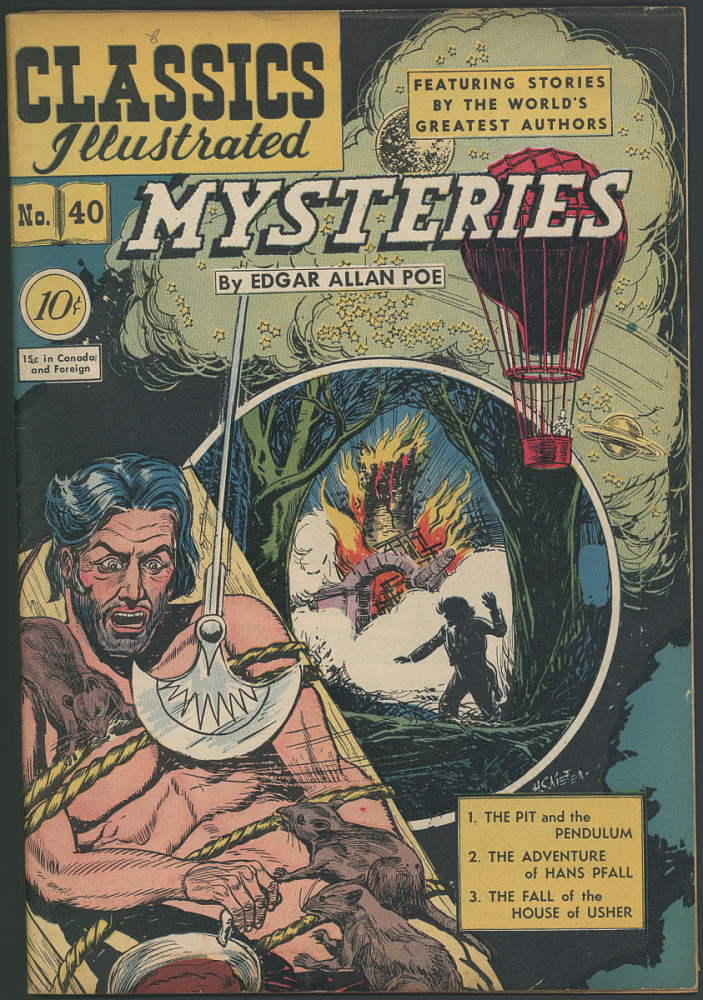
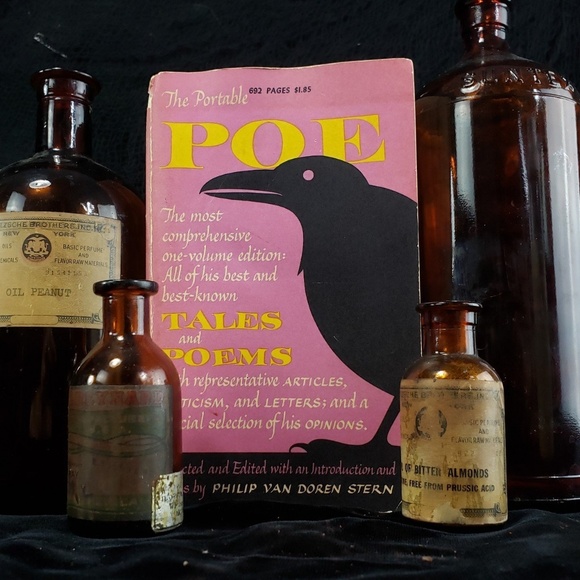
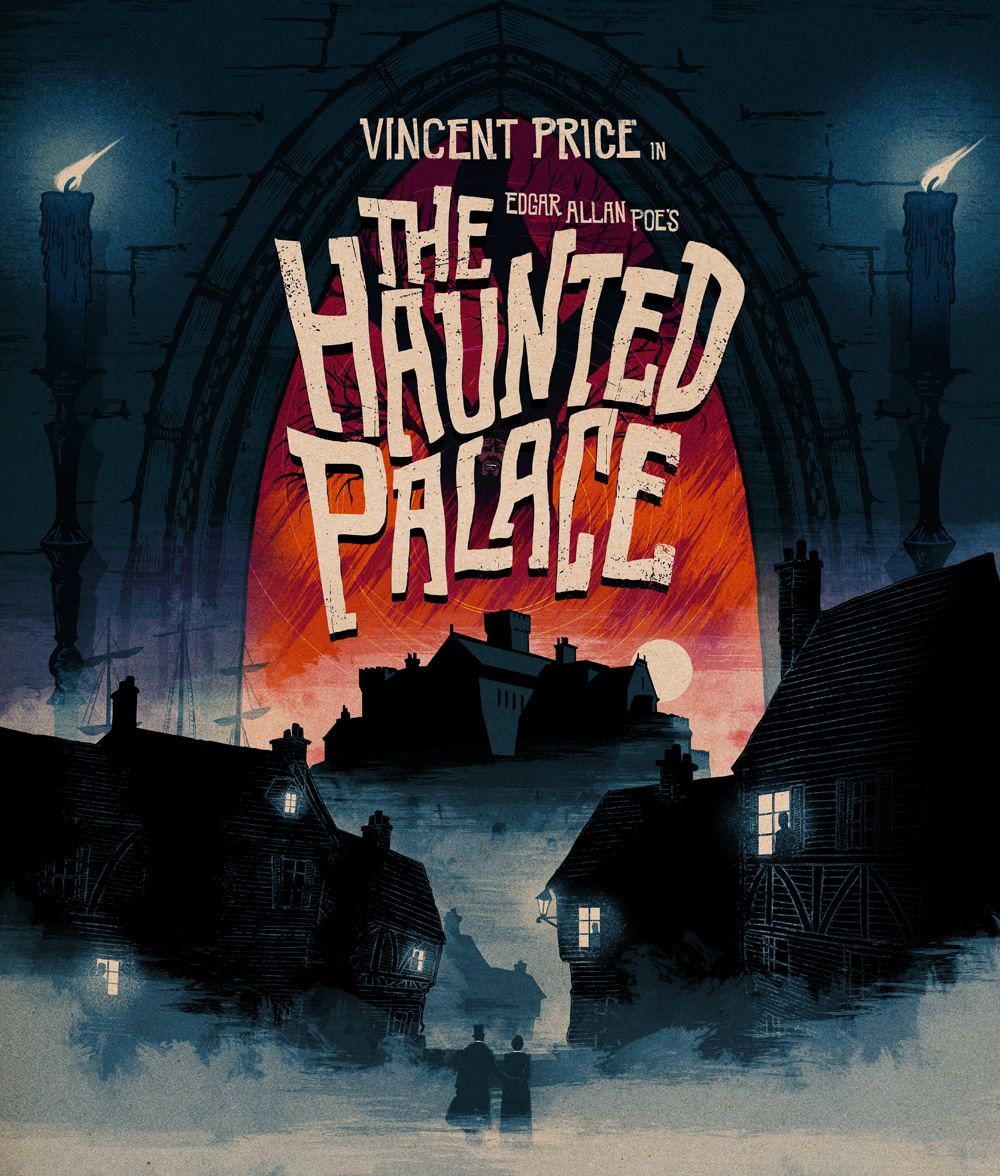
Email all work for the course to me at [email protected]
Zoom link https://ufl.zoom.us/s/93808236002
When you are preparing to co-lead class discussion, create a google doc with your partner and share it with me by 5:00 the day before class. (Give me permission to edit too.) I will add my thoughts. Please email after you have read my comments.
“A good reader, a major reader, an active and creative reader is a rereader.”
--Vladimir Nabokov
"Happiness has no story."
--Jules Barbey
On ‘S.N.L.’, Jim Carrey Reads a Spooky Election Update of ‘The Raven’
Jim Carrey kicked off 'SNL' with an election-themed re-write of 'The Raven'
All page references are to Kevin Hayes' The Annotated Poe.
Two Discussion Questions (DQs) and Three BIG WORDS are due every Sunday and Tuesday by 5:00 p.m. unless otherwise noted.
--Edgar Poe, "The Murders of the Rue Morgue"
"Es läßt sich nicht lesen."
--Edgar Poe, "The Man of the Crowd"
Jennifer West on Ed Ruscha STAINS, 1969
Ed Ruscha: Buildings and Words


If you sometimes feel melancholic, sometimes joyous, sometimes anxious; if you love words, word play, and the sounds words can make (the musicality of language); if you like to make up words (neologisms) if you like to read stories, especially detective mysteries, enigmatic ghost and horror stories, and sad poems; if there is something you what to understand about the world and you don't quite know what it is; if you are reflective; if you have the patience to read closely and the stamina to keep doing it; if you are not particularly squeamish; if you care; if you have a sense of humor; if you don't mind reading really long sentences with numerous dependent clauses, all of which begin with the same word as this one does; if all this is the case, I say, you should be fine in this class. Some literature can be therapeutic. Use only under a doctor (of philosophy) 's supervision, however. FYI: Elizabeth Bishop, "One Art." Poems are good.
This will be a discussion class, not a lecture, and I will encourage you to befriend each other by meeting in small break out groups and by co-leading class.
TENTATIVE SCHEDULE (Please expect minor adjustments to be made in the schedule from time to time; all changes will be announced both in class and on the class email listserv.)
Poe meant for his Tales to be read in one sitting. I recommend that you read each assigned Tale twice, perhaps in two sittings.
Poe Resources / Purposive Pedagogical Fragmentation (not the same thing as confusion)
August 31
Thunderstorm
XAVER VARNUS PLAYS BACH'S TOCCATA & FUGUE IN THE BERLINER DOM
YOUR FIRST ASSIGNMENT: DUE SEPTEMBER 1 by 5:00 PM: Send in one word document to me at [email protected]. (See below)
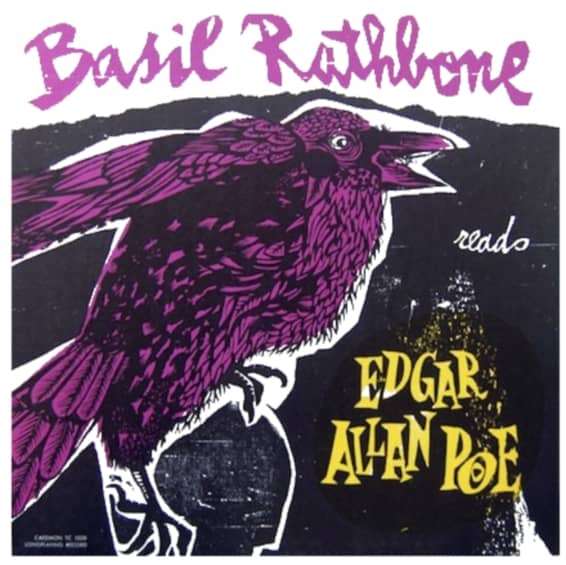
Edgar Allan Poe’s “The Raven,” Read by Christopher Walken, Vincent Price & Christopher Lee
"The Raven" (Poetry Foundation) read by James Earl Jones without music and with music and rainstorm.
"The Raven" (Poetry Foundation) read by Christopher Lee without music or sound effects and with music
“The Raven,” read by Christopher Walken with sound effects and music gradually introduced.
Jorge Luis Borges, trans. Sergio Waisman, "The Genesis of Poe's "The Raven" Poe Studies, Volume 53, 2020, pp. 140-143.
Jorge Luis Borges, trans. Sergio Waisman, "Edgar Allan Poe," Poe Studies Volume 53, 2020 pp. 144-145
YOUR FIRST and DIfFERnENt ASSIGNMENT is in Three Parts: DUE SEPTEMBER 1 by 5:00 PM:
Send all three parts in one word document as an attachment to me at [email protected]. Don't forget to put your name in the upper left corner.
Part 1. One Discussion Question (DQ) on the film The Raven (dir. James McTeigue, 2011) (Click on the blue link. You'll have to rent the film)
Part 2. One DQ on Edgar Allan Poe's poem "The Raven" (Annotated Poe version)
Part 3. Three BIG WORDS Poe uses in "The Raven"
DUE September 1 by 5:00 PM: Send all three parts in one word document to me as an attachment at [email protected]. Don't forget to put your name in the upper left corner. Email all future work for the course to me at [email protected].
September 2 Good Mourning to Poe, or Poe's Invitation and Resistance to (Auto)Biographical Criticism (including most kinds of psychoanalytic criticism) The writer is not to be confused with the person (hagiography or ad hominem).
Required Reading and Viewing:
1. Edgar Allan Poe, "The Raven" (Kevin Hayes, ed. The Annotated Poe, pp 374-84)
2. The Raven (dir. James McTeigue, 2011) You'll have to borrow or rent the film if you can't find it streaming for free. :(
Recommended Reading and Viewing:
Edgar Allan Poe’s “The Raven,” Read by Christopher Walken, Vincent Price & Christopher Lee
"The Raven (Poetry Foundation)"
YOUR SECOND and DIfFERnENt ASSIGNMENT is in Two Parts: DUE SEPTEMBER 3 by 5:00 PM:
Part 1. One Discussion Question (DQs) on “The Philosophy of Composition” / Hayes, pp. 113-31 / facsimile pdf and Three BIG WORDS that Poe uses. (Please look them up and copy the words and their definitions in your word document.)
Part 2. Your Transcription of The Simpsons' abridgment of "The Raven" from Season 2 Episode 3: Treehouse of Horror Cut and paste "The Raven (Poetry Foundation)" into a word document. Put your name in the upper left corner of the document and save it. With your word document open, listen to the Simpsons' "The Raven" and (a) transcribe all additional dialogue and (b) strike through all lines from the "The Raven" that the Simpsons writer of the abridgement cut. You will need this transcription in order to write your first paper.
Please put both items in the same document and put your name in the upper left corner. Email the document to me as an attachment at [email protected]
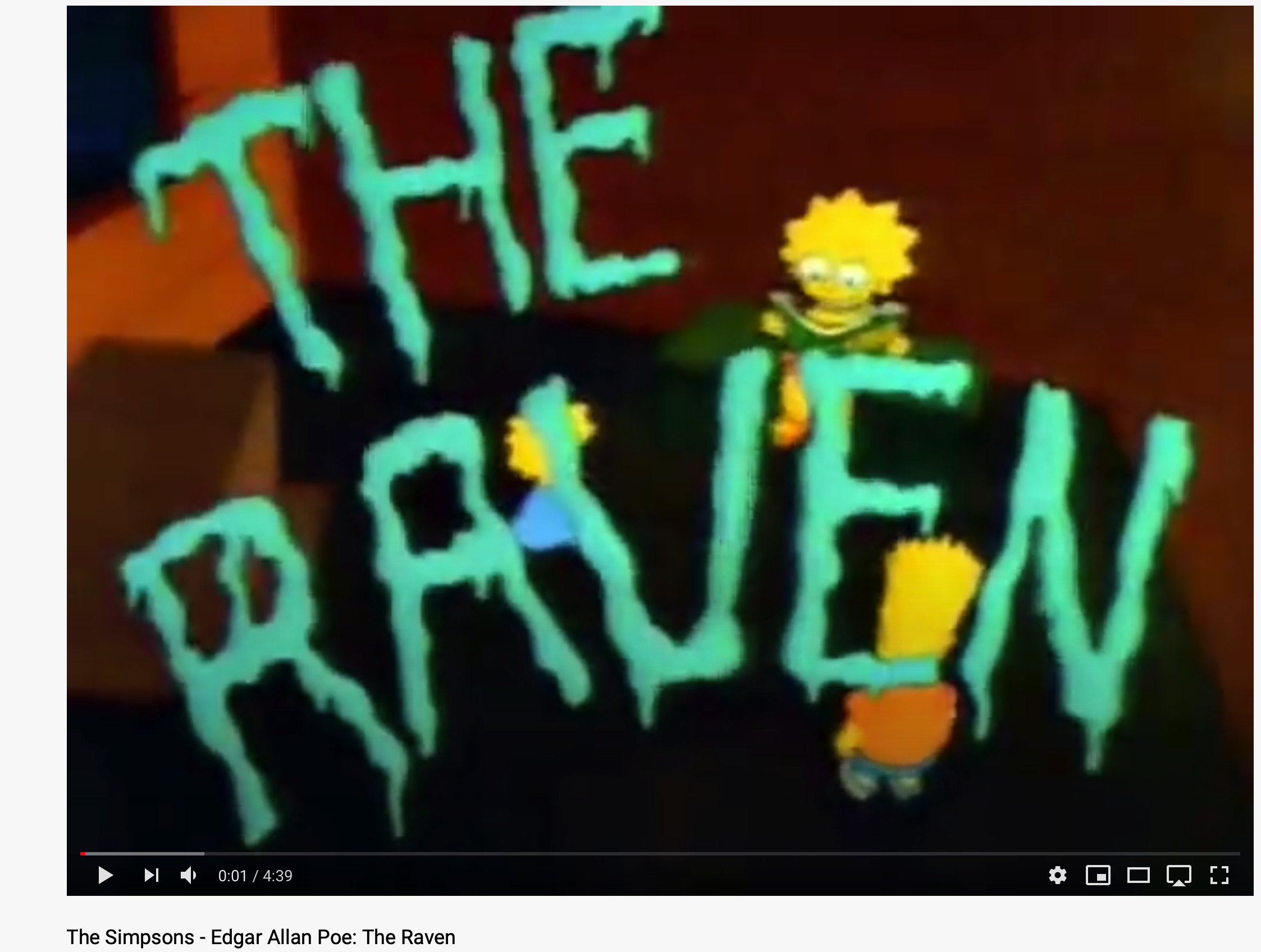
September 4 (We will work in small groups for part of this class.)
One Required Reading and One Required Viewing (Write one DQ on “The Philosophy of Composition” (1846) and one on The Simpsons' abridgment of "The Raven" and three BIG WORDs) (Please look the words up and copy the words and their definitions into your word document.):
1. Edgar Allan Poe, “The Philosophy of Composition” (1846), p. 113-31 / facsimile. (Consider it as Poe's reading of his poem ""The Raven (Poetry Foundation)." Can we take Poe's account at face value? Or is he playing us?)
2. Your Transcription of The Simpsons' adaptation of "The Raven" from Season 2 Episode 3: Treehouse of Horror by Edgar Allen Poe Read by James Earl Jones. You will need this transcription in order to write your first paper.
Recommended Reading:
"The Raven (Poetry Foundation)"
Charles Dickens to Edgar Allan Poe — March 6, 1842
Joseph N. Riddel, "The 'Crypt' of Edgar Poe," boundary 2 Vol. 7, No. 3, Revisions of the Anglo-American Tradition: Part 2 (Spring, 1979), pp. 117-144
Jodey Castricano, "The First Partition: Without the Door," in Cryptomimesis: The Gothic and Jacques Derrida's Ghost Writing ( (2001, pp. 5-30)
Shawn Rosenheim, "The King of `Secret Readers': Edgar Poe, Cryptography, and the Origins of the Detective Story," ELH, January 1989, (pp. 375-400).
Laurent Milesi, Towards a Cryptanalysis: Genealogies of ‘Lit-Crypts’ from Poe to the ‘Posts’
Louis A. Renza, ‘Poe's Secret Autobiography,’ in The American Renaissance Reconsidered,
Ed. Walter Benn Michaels and Donald E. Pease (1985), esp. pp. 61-69
September 7
LABOR DAY
FIRST PAPER DUE September, 12 by 11:59 p.m. (PAPER TOPICS)

DUE Tuesday September 8 by 5:00 p.m: One DQ on "Manuscript Found in a Bottle" and one DQ on Kevin J. Hayes' "Introduction" to The Annotated Poe and three BIG WORDS Poe uses (look them up and copy the words and their definitions in your word document). Email all work for the course to me at [email protected].
You can read Kevin J. Hayes' "Introduction" to The Annotated Poe ?for free online. The entire introduction is included in the preview. Here's on to find the "Introduction." Go to this link: https://www.amazon.com/Annotated-Poe-Edgar-Allan/dp/0674055292 Click on the "look inside" feature next to the book cover on your left. When the preview opens click on "first pages." You will be directed the "Metzengerstein," the first tale in the book. But if you scroll up, you'll see page 22 of the Introduction. Just keep scrolling up until you get to page one. And then start reading. :).
If you don't have one of the required books, you can read "Manuscript Found in a Bottle"
here. You will also find Poe's stories and novel on this website (click). You can find lots of online versions of Poe's tales and poems by googling "Poe" and the title. This is the first edition (posthumously published) of Poe's works: The Works of the Late Edgar Allan Poe (1850) by , edited by Rufus Wilmot Griswold
September 9
2 REQUIRED READINGS (Write one DQ on each reading and three BIG WORDs in total.)
1. Edgar Allan Poe and Kevin J. Hayes, Ed. "Introduction," The Annotated Poe, 3-21.
2. Poe, "Manuscript Found in a Bottle," pp. 36-48 (All page references are to The Annotated Poe.)
Recommended Reading:
An introduction to The Rime of the Ancient MarinerRevised version of The Rime of the Ancient Mariner
Alfred Lord Tennyson, "The Kraken"
Kevin Hayes, "Appendix: First Printings, Reprints, and Translations Published During Poe's Lifetime," The Annotated Poe, 397-402.
Due Thursday September 10 by 5:00 p.m: Three DQs total: One DQ on each tale we'll discuss September 11 and three BIG WORDS Poe uses. Email all work for the course to me at [email protected].
September 11 Poe's Plagues: Covid-19
3 REQUIRED READINGS (Write one DQ on each reading, three BIG WORDs in total.)
1 "The Masque of the Red Death," pp. 233-30 (All page references are to Hayes' The Annotated Poe.)
2. "Hopfrog," pp. 359-69
3. "King Pest the First" (I have linked this story because it is included in The Annotated Poe.)
FIRST PAPER DUE September, 12 by 11:59 p.m. (PAPER TOPICS)

Recommended:
5 Hours of Edgar Allan Poe Stories Read by Vincent Price & Basil Rathbone
Poe, "The Masque of the Red Death" Read by Basil Rathbone
Nathaniel Hawthorne, “The Wedding Knell,” inTwice-Told Tales (1837)
Nathaniel Hawthorne, Legends of the Province House, etc. : being second series of Twice-told tales
PBS Documentary Edgar Allan Poe: Buried Alive (2016)
The Seventh Seal (dir. Ingmar Bergman,1957)
Jill Lepore, "What our contagion fables are really about," New Yorker 03, 30, 2020
The Masque of Red Death (dir. Roger Corman, 1964) Roger Corman film trailer
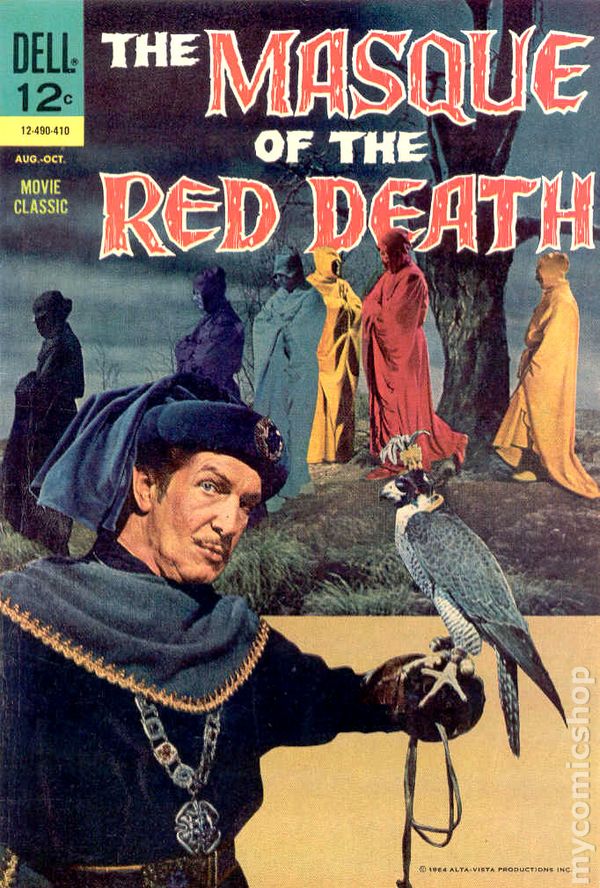
FIRST PAPER DUE September, 12 by 11:59 p.m. (PAPER TOPICS)
LIVE GRADING Office Hours: M W F 10:35-11:15, and by appointment.
https://ufl.zoom.us/j/96538395602?pwd=aEFhdEwyY3ByQm1XT1puVmV5MkhnQT09
DIfFERnENt Assignment.! Due September 13 (See below.)
FYI: Jerome McGann reads selected poems by Edgar Allan Poe
DUE September 13: DIfFERnENt Assignment. One DQ on any two of the three assigned poems (your choice) and 50 words arguing which of the three poems is the best and why you think so (using the texts only as your evidence).
September 14: PoesCrypt 1. Down in the Crypt, or Po' Poe
3 REQUIRED READINGS:
1. "Ulalame, A Ballad," pp. 385-89 (All page references are to Hayes' The Annotated Poe.)
Just fyi; Jeff Buckley * Ulalume
2. "Annabel Lee," pp. 393-95; just fyi "Annabel Lee" by Edgar Allan Poe (read by Basil Rathbone)
3. "Lenore" (cf. "The Raven"); just fyi Lenore - Edgar Allan Poe
https://openlibrary.org/books/OL7123388M/Lenore.
Recommended:
Poe, "Eulalie"
BBC Documentary
Edgar Allan Poe Love Death and Women (2010)
Kennedy, J. Gerald. "Poe, 'Ligeia', and the Problem of Dying Women" collected in New Essays on Poe's Major Tales, edited by Kenneth Silverman. Cambridge University Press, 1993.
Floyd Stovall, "THE WOMEN OF POE'S POEMS AND TALES," Studies in English No. 5 (October 8, 1925), pp. 197-209
Jerome McGann reads selected poems by Edgar Allan Poe
Jerome McGann introduction to Poe Alien Angel
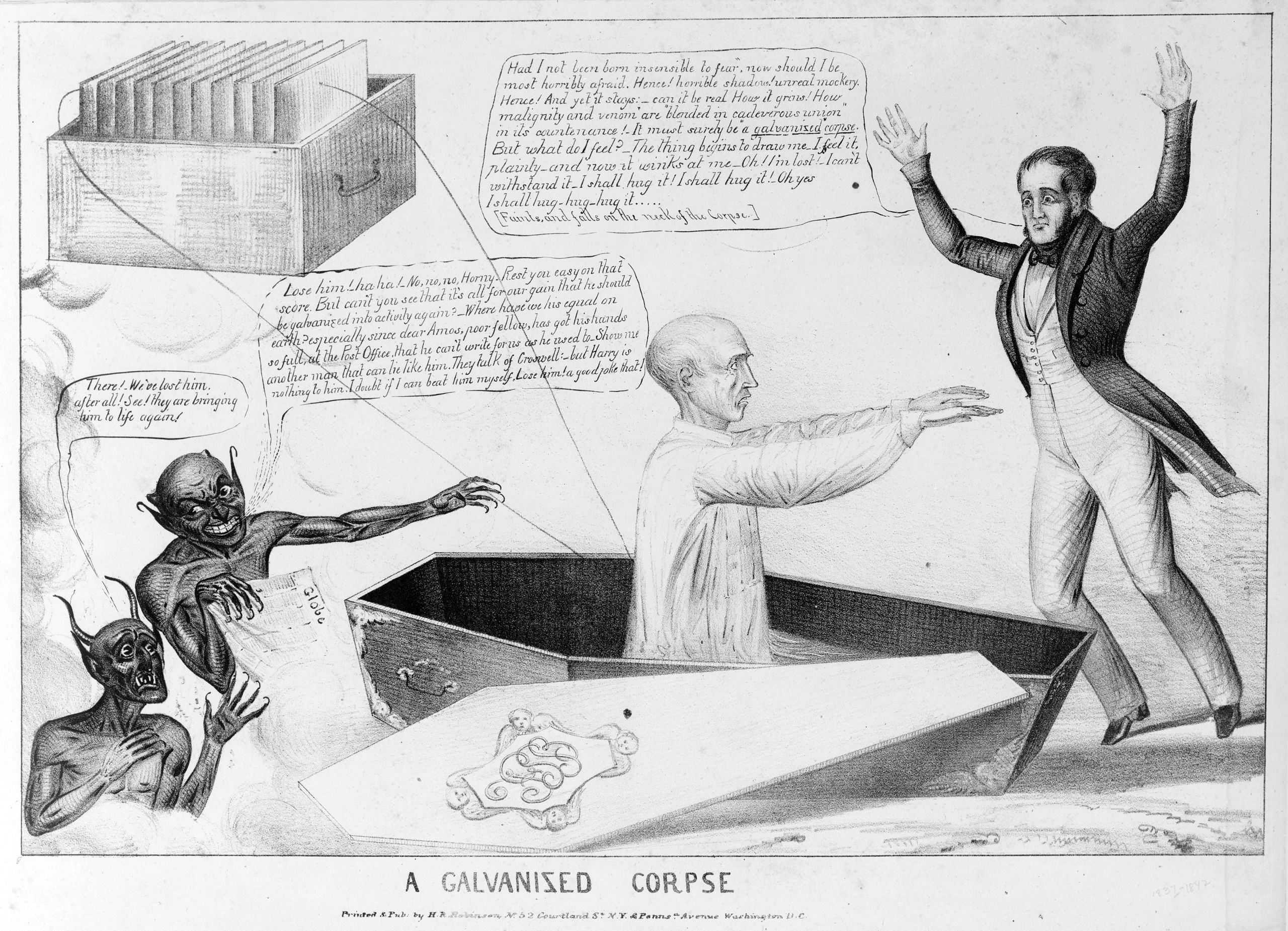
DIfFERnENt Assignment.! Due September 14 (See below.)
DUE September 15: DIfFERnENt Assignment. (Write 3 DQs, one on each reading, plus 3 Big Words; and 50 words on which of the three tales is the best. :)
September 16 Poe's Corpse Brides
3 REQUIRED READINGs: (Write 3 DQs in total, one on each reading, plus 3 Big Words; and we'll discuss your 50 words on which of the three tales is the best.)
"Ligeia," 65-82
"Berenice," pp. 49-58
"Morella," pp. 59-64
Recommended:
Poe: "The Conqueror Worm" (read by Vincent Price)
"Eleonora"
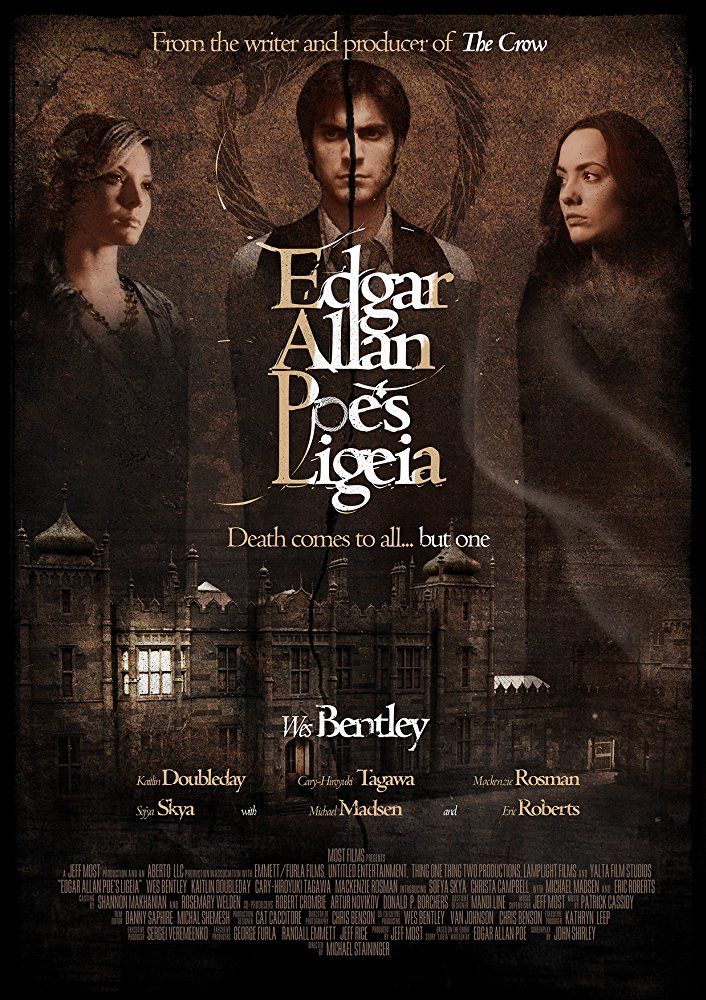

The Tomb / Edgar Allan Poe's Ligeia (2009) | Official Trailer

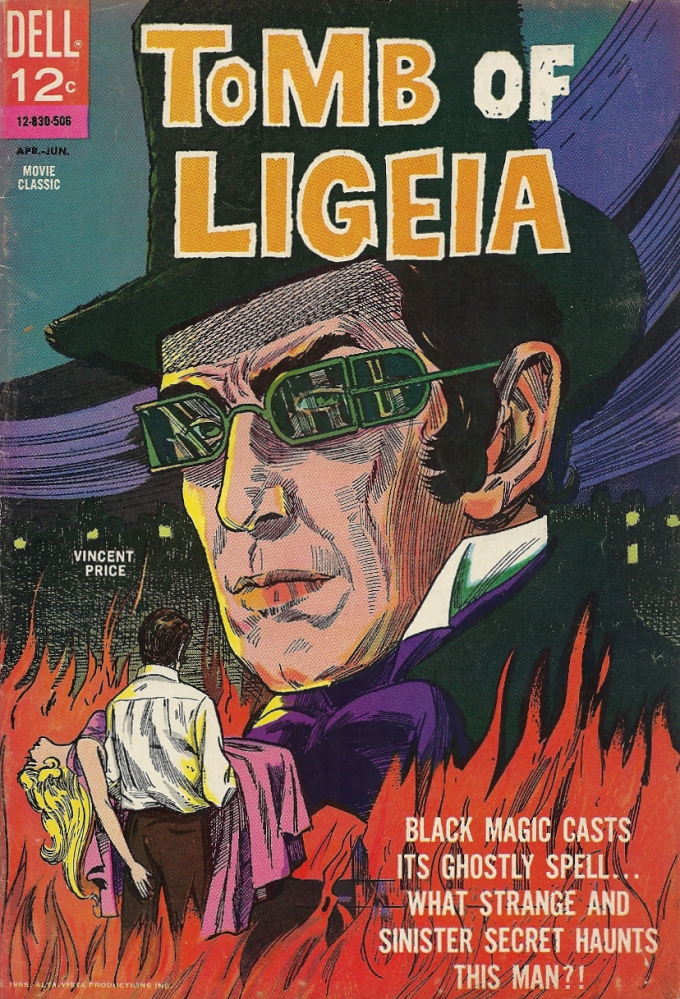
Poe Is Cancelled. Po/E/Mo/TiOn

The Northern Southern Gothic: Harriet Beecher Stowe, Uncle Tom's Cabin, Chapter 42 "An Authentic Ghost Story"
Sentimentalism and Domestic Fiction
Sensationalist Novel / Gothic Novel / Sensibility / Poe's detectives as Romantic heroes of sensibility
Robert Montgomery Bird, Sheppard Lee,Written By Himself Vol. 1
Sheppard Lee, Written by Himself. Vol. 2 (of 2)
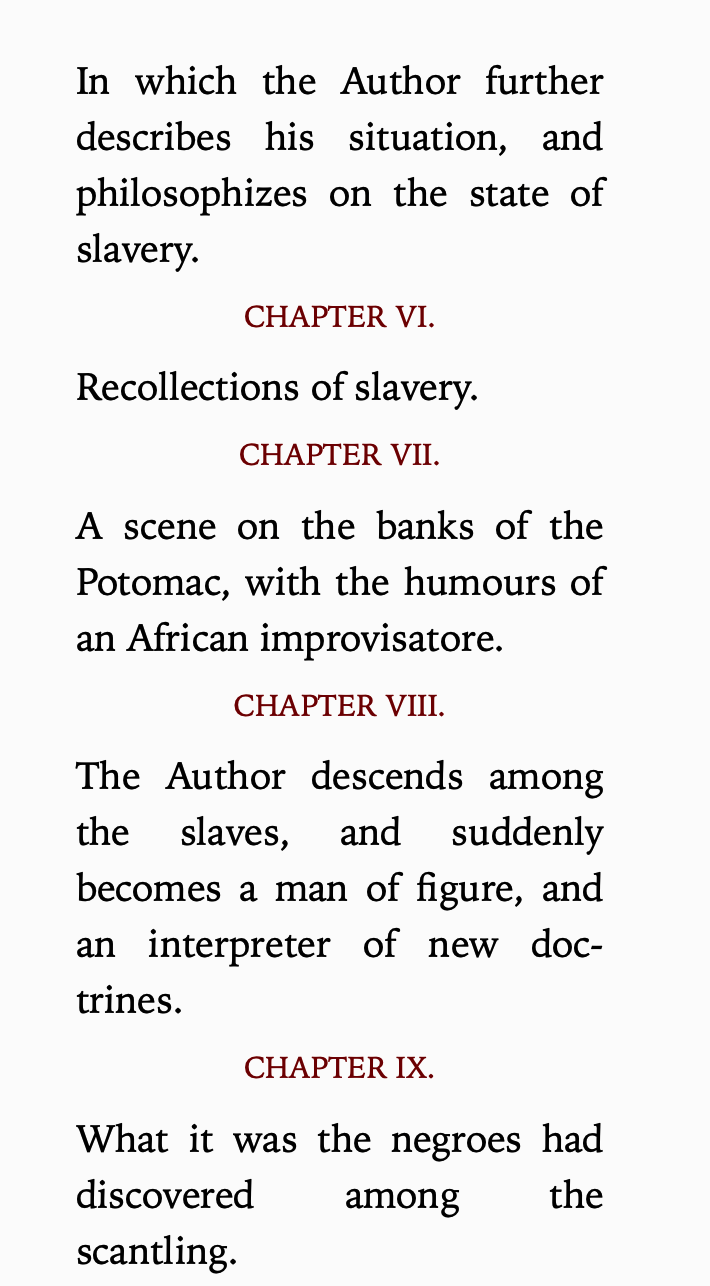

"Sheppard Lee is an identity thief. . . . Poe would have preferred an essentially constant narrative focus, a consciousness continually and con-sistently present to itself (and to Bird’s readers), from whose stable perspective the wide variety of social circumstances and events depicted in the novel would be perceived—circum-stances and events that, it might be, would slowly have an im- pact upon that consciousness. Such a protagonist might look different (because he changed bodies), and therefore pass as someone else in the eyes of others, but would retain a secure sense of self-identity nevertheless. Bird, however, dramatized another, quite different possibility: that identity would be nearly lost from one reincarnation to the next.
This seems, finally, to be Bird’s rather pointed agenda: to put his readers on notice that, in these fraught times of national struggle over slavery, and in the face of intractable political dilemmas, he could give no affordance for moralistic complacency of any sort." Christopher Looby, "Introduction," Sheppard Lee Written by Himself
Edgar Allan Poe (ed. J. A. Harrison), “Review of Sheppard Lee,” The Complete Works of Edgar Allan Poe — Vol. IX: Literary Criticism - part 02 (1902), pp. 126-139
Maurice S. Lee, "Absolute Poe: His System of Transcendental Racism," American Literature, Volume 75, Number 4, December 2003, pp. 751-781, see pp. 758-763
Historicist criticism of Poe's works always turns out to be psychological criticism of Poe the man, often retelling Poe's story as a story about Poe. It's another kind of kind of nonreading of Poe's "unreadable" works that the works themselves may elicit or even solicit.
T. S. Eliot, "From Poe to Valéry," The Hudson Review, Autumn, 1949, Vol. 2, No. 3 (Autumn, 1949), pp. 327-342
Poe, "A Tale of the Ragged Mountains"
September 21Poescryption .2: Opening the Crypt
ONE REQUIRED READING AND ONE VIEWING (Write one DQs and three BIG WORDS on the reading and one on the film.)
1. "The Fall of the House of Usher," pp. 95-116.
2. The Fall of the House of Usher (dir. Jan Svankmajer, 1980)
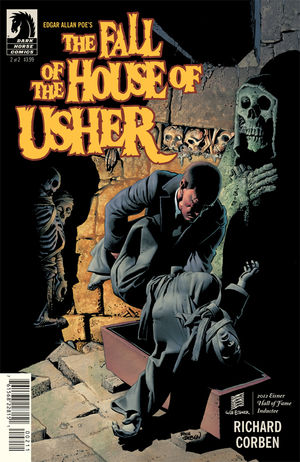
Recommended:
Leo Spitzer, "A Reinterpretation of "The Fall of the House of Usher"
"The Fall of the House of Usher" read by Basil Rathbone
The Haunted Palace (read by Basil Rathbone)
Edgar Poe, The Fall of the Usher Comic Book
The Fall of the House of Usher (dir. Jean Epstein, 1928)
Histoires extraordinaires (dir. Jean Faurez, 1949)
The Fall of the House of Usher - 1950
The House of Usher - Vincent Price (1960) - Official Traile
The Fall of the House of Usher (1979) Classics Illustrated film series
The House of Usher (dir. Hayley Cloake, 2006)
USHER (Chris Harrington, 2002, 38 mins.)
The Fall of the House of Usher animated with subtitles Edgar Allan Poe Read by Christopher Lee (2015)
Edgar Allan Poe, “The Fall of the House of Usher.” In Burton’s Gentleman’s Magazine. Philadelphia: William E. Burton, September 1839.
September 23
REQUIRED READING:
Poe, "William Wilson," pp. 117-37
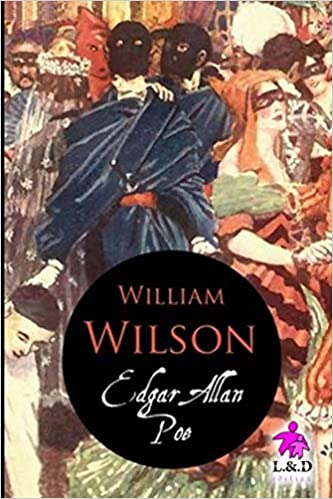
Recommended:
Edgar Allan Poe (ed. T. O. Mabbott) WILLIAM WILSON
Washington Irving, An Unwritten Drama of Lord Byron
Edgar Allan Poe to Washington Irving — October 12, 1839 (LTR-083a)
THE WEIRD CIRCLE: WILLIAM WILSON - POE - OLD TIME RADIO
William Wilson is adapted in this film:
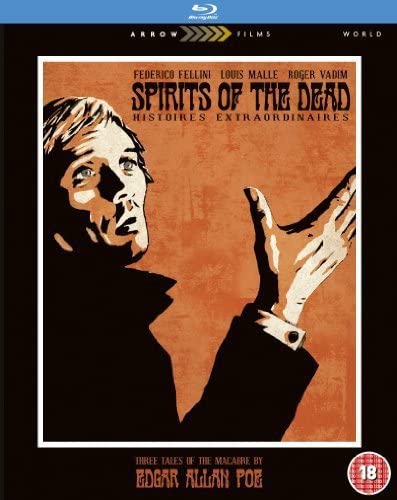
Spirits of the Dead is available on the Criterion Channel, linked below.
Metzengerstein is adapted by Roger Vadim as well. "Never Bet the Devil Your Head" is adapted by Fellini and retitled "Toby Dammit."
September 25
REQUIRED READING:
Poe, "A Descent into the Maelström," pp. 210--28
Recommended:
Philip Glass: Descent Into the MaelstromJoseph Glanvill, Witchcraft, and Seventeenth-Century Science
"The Unparalleled Adventure of One Hans Pfaall"
September 28
1 REQUIRED Viewing and 3 REQUIRED READINGs (Write four DQs in total, one on each of the four numbered below):
1. Poe, "The Pit and the Pendulum," pp. 241-58
2. Poe,"The Cask of Amontillado," pp. 350-58
3. Poe, "The Premature Burial"
4. Poe, The Pendulum, the Pit and Hope (dir. Jan Švankmajer, 1983) The film unites Poe's story with Auguste, comte de Villiers de L'Isle-Adam's adpatation of it, “Torture by Hope”
Recommended:

Edgar Allan Poe - The Pit and the Pendulum with subtitles (Read by Christopher Lee)
The Cask of Amontillado with subtitles - Edgar Allan Poe (Read by Christopher Lee)
The Cask of Amontillado (Edgar Allan Poe) PBS
In “Torture by Hope” (in French "La Torture par l'espérance" Cruel Tales (1883), Auguste, comte de Villiers de L'Isle-Adam adapted Poe's Pit and the Pendulum intended to make Poe's story moe cruell.
Jorge Luis Borges translated "La Torture par l'espérance"and shortened the title to "Hope" ("La speranza") in order to make it even more cruel. Villiers de L'Isle-Adam's title gave away the story.
Tebb, William; Vollum, Edward Perry Premature burial, and how it may be prevented, with special reference to trance catalepsy, and other forms of suspended animation (1905)
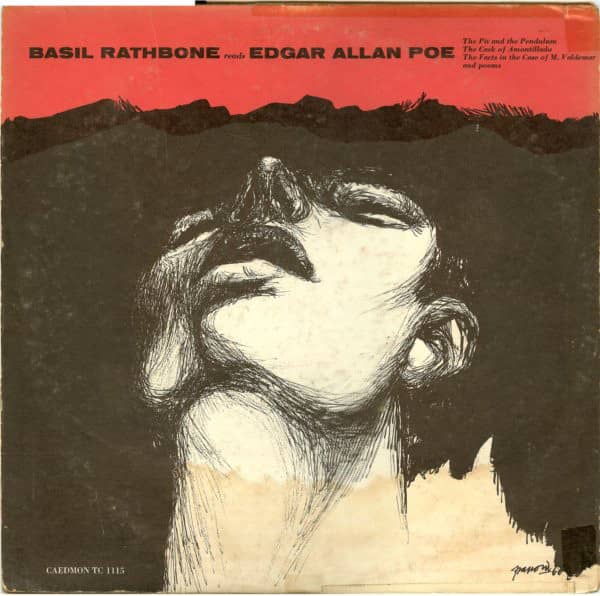
September 30
Poe, "The Imp of the Perverse" / Poe, "The Imp of the Perverse" (read by Vincent Price) (part essay, part tale; call back to the "evil moment" in "Berniece")
October 2
"I'm Not Dead Yet" Paris Review 2016
Poe, "THE ANGEL OF THE ODD- AN EXTRAVAGANZA" (1850)
Robert Louis Stevenson, "The Bottle Imp"
Classics Illustrated -116- The Bottle Imp (1954)

Jan Bondeson, Buried Alive: The Terrifying History of Our Most Primal Fear (2002)
The Premature Burial (1962) - Official Trailer
The POV coffin scene in Vampyr (dir. Carl Dreyer, 1932)
Poe's sources for "The Pit and the Pendulum":
Anecdote towards the Spanish Inquisition Literary Gazette 1820
Ireland, W. H., The Abbess: A Romance (1799)
Critical Introduction to The Abbess By Benjamin Frankin Fisher, IV to 1974 edition
October 5 Poescryption / POE .2: Narrator Kills It
3 REQUIRED READINGs (Write 3 DQs in total)
1. Poe, “The Black Cat," pp. 306-17
2. Poe, “The Tell-Tale Heart," 259-65
3. Christopher Benfey, "Poe and the Unreadable: “The Black Cat" and “The Tell-Tale Heart," pp. 29-37
Recommended:
Edgar Allan Poe, “Instinct vs Reason — a Black Cat” [Text-02], Alexander’s Weekly Messenger, vol. 4, no. 5, January 29, 1840, p. 2, cols. 6-7
"Cryptoanalysis" in Robert Regan, "Hawthorne's "Plagiary"; Poe's Duplicity, Nineteenth-Century Fiction, Dec., 1970, Vol. 25, No. 3 (Dec., 1970), pp. 281-298.
Laurent Milesi, "Towards a Cryptanalysis: Genealogies of ‘Lit-Crypts’ from Poe to the ‘Posts’" Parallax Volume 15, 2009 - Issue 1: inscr(i/y)ptions
Christopher Lee reads The Tell-Tale Heart Tales of Mystery & Horror by Edgar Allan Poe
The Tell Tale Heart - 1953 narrated by James Mason
The Tell-Tale Heart (dir. Ernest Morris, 1960)
Iggy Pop, "The Tell-Tale Heart"
Edgar Allan Poe’s “The Tell Tale Heart” Read by Bela Lugosi (1946)
Stefan Andriopoulos, "Chapter 3, "Ghost Narratives and the Gothic Novel: Print Culture and Reading Addiction," in Ghostly Apparitions: German Idealism, the Gothic Novel, and Optical Media, pp. 73-104
October 7
3 REQUIRED REREADINGs
DIfFERnENt Assignment.!
Write 1 DQ on similarities between The Imp of the Perverse and The Tell-Tale Heart; and write one DQ on similarities between The Imp of the Perverse and The Black Cat.
1. Poe, “The Black Cat," pp. 306-17
2. Poe, “The Tell-Tale Heart," 259-65
Poe, "The Imp of the Perverse" / Poe, "The Imp of the Perverse" (read by Vincent Price) (part essay, part tale; call back to the "evil moment" in "Berniece")
3. Christopher Benfey, "Poe and the Unreadable: “The Black Cat" and “The Tell-Tale Heart," pp. 37-43.

October 9 Nothing required, but read these these short pieces anyway:
1. BY THE LATE EDGAR A. POE, The Poetic Principle (1850)
2. Poe, "THE ANGEL OF THE ODD- AN EXTRAVAGANZA" (1850)
Edgar Allan Poe, ''The Tell-Tale Heart,'' in: The Pioneer. A Literary and Critical Magazine. Vol. I, No. 1. Edited by J. R. Lowell and R. Carter. Boston: Leland and Whiting, January 1843.
The Tell-Tale Heart in The Broadway Journal 1845-08-23: Vol 2 Iss 7
The Best Versions Of Poe’s Tell-Tale Heart
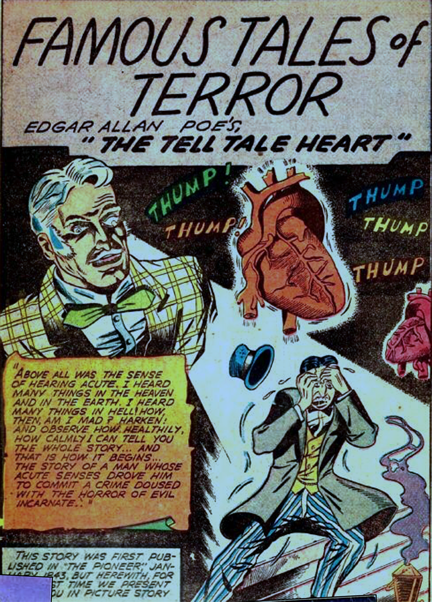
The Black Cat - Diamanda Galás
The Black Cat (dir. Lucio Fulci, 1981)
MYSTERY IN THE AIR: THE BLACK CAT - PETER LORRE
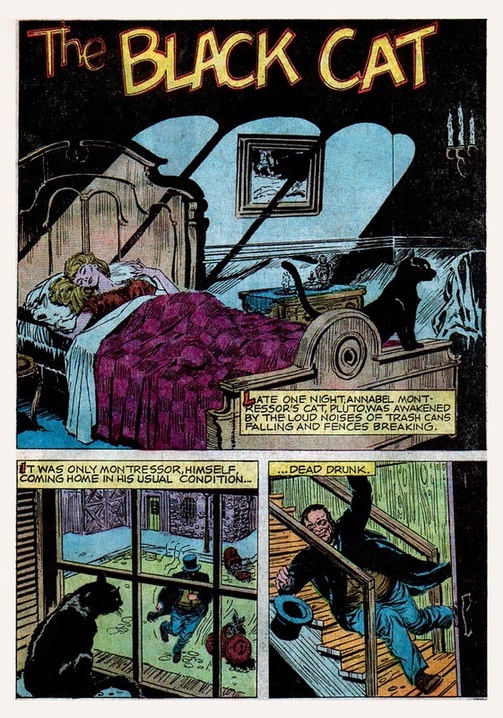
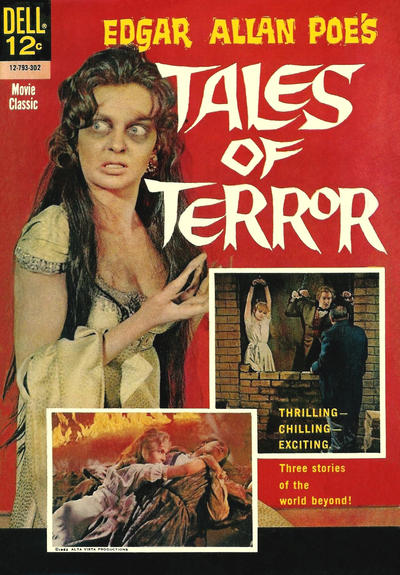
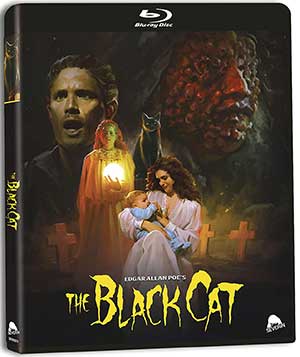
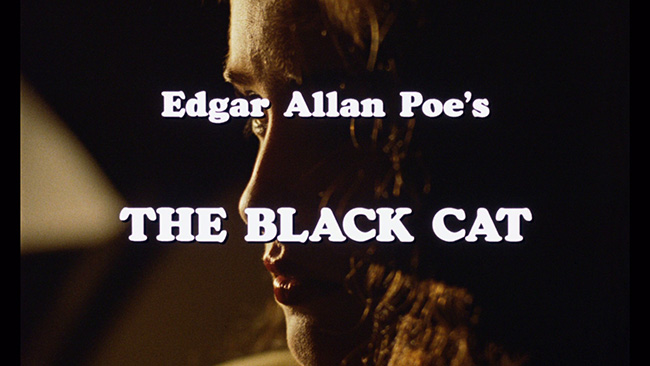
October 12 Poencryption "Es läßt sich nicht lesen." Google translate
REQUIRED READING:
Poe, "The Man of the Crowd," pp. 163-74
Recommended:
October 14
REQUIRED READING:
Nathaniel Hawthorne, "Wakefield" (Poe loved it.)
Recommended READINGs
Edward Bulwer Lytton's novel, EUGENE ARAM A TALE (1832)
Poe's review of Lytton's novel.
Bran Nicol, "Reading and Not Reading 'The Man of the Crowd': Poe, the City, and the Gothic Text," Philological Quarterly, 91 (3) (Summer, 2012): 465-93.
Stephen Rachman, “Reading Cities: Devotional Seeing in the Nineteenth Century,” ALH 9 (Winter 1997), pp. 653- 675
Charles Dickens (and Poe's Man of the Crowd), "The Streets—Morning, The Streets—Night, Shops and their Tenants, Meditations in Monmouth-Street, and Gin-Shops," in Sketches from Boz
Sketches by Boz "The Drunkard's Death"October 16 POE-unctuation! (and predictive text)
REQUIRED READINGS (NO DQs or BIG WORDS required):
Read Poe on the dash in "Marginalia," Essays and Reviews, ed. G. R. Thompson (New York: Library of
America, 1984), p. 1425-26. This is the text with the part Benfey quotes on the dash as a second thought or emendation. Poe mentions John Neal, linked above. You'll have to adjust the size of p. 1425 in the pd5. Zoom In several times. Sorry.
Skim Poe's “The Philosophy of Composition” / Hayes, pp. 113-31 / facsimile pdf and focus just on Poe's use of dashes. to interrupt himself
Skim “The Black Cat," pp. 306-17 and “The Tell-Tale Heart," 259-65 and find the parts where Poe uses lots of dashes for dramatic effect.
Read these excerpts from two book reviews Poe wrote
Recommended READINGs
John Neal, "To Byron" The Portico [Baltimore] 4 (July-August 1817) ,149-50.
Lord Byron, "Manfred" / Archive.org / Modern Critical Edition
Lord Byron, "Darkness"
Jane Stabler, "The Dashes in Manfred"
BY THE LATE EDGAR A. POE, The Poetic Principle (1850)
--Poe, "THE ANGEL OF THE ODD- AN EXTRAVAGANZA" (1850)
--Poe "The System of Doctor Tarr and Professor Fether"
--Poe, Second Review of Hawthorne's Twice-Told Tales
Nathaniel Hawthorne, Twice-Told Tales A Review by Edgar Allan Poe Graham's Magazine, April, 1842 [as reprinted in pages 568-9 of Edgar Allan Poe: Essays and Reviews, The Library of America, 1984]
Edgar Allan Poe, "Mellonta Tauta" (1849)
October 19 Decryption 3. Cryptograms, Ciphers, Cryptography
REQUIRED READING
Poe, "The Gold Bug," first part, pp. 267-89. This part stops at the end of this paragraph: "When at length, we had conclded our examination, the and the intense excitement of the time . . . . . a full detail of all the circumstances connected with it."
Recommended Reading:
Frederick Douglass, "The Heroic Slave"
Poe, "A FEW WORDS ON SECRET WRITING"
Kevin McLauglin, "Distraction in America: Paper, Money, Poe," in Paperwork: Fiction and Mass Mediacy in the Paper Age, 29-49; 128-35.
Louis J. Budd, Edwin Harrison Cady, Ed. On Poe
JODEY CASTRICANO, "The First Partition: Without the Door," Cryptomimesis: The Gothic and Jacques Derrida's Ghost Writing (2001), 5-30
Edgar Allan Poe’s Contributions to Alexander’s Weekly Messenger, (1943)
J. Gerald Kennedy, Romancing the Shadow: Poe and Race (There are some literal-minded or essays in this collection. I find many of the readings of Poe's Tales to be unpersuasive.)
William F. Friedman, "Edgar Allan Poe, Cryptographer" American Literature Vol. 8, No. 3 (Nov., 1936), pp. 266-280
Terence Whalen, "The Code for Gold: Edgar Allan Poe and Cryptography," Representations, No. 46 (Spring, 1994), pp. 35-57
Poe, SOME SECRETS OF THE MAGAZINE PRISON-HOUSE
A satire of paper money and "Gold Humbug":

October 21
REQUIRED READING:
Poe, "The Goldbug," second part, pp. 290-305 It begins: “You remember,” said he, “the night when I . . . "
October 23
The Gold Bug Classics Illustrated
Recommended:
--Poe (facsimile), A FEW WORDS ON SECRET WRITING
The Tyler letter, the third Addendum to "A Few Words on Secret Writing (with two ciphers below)
Some scholars think that the cipher was written not by its signatory, W.B. Tyler, or written pseudonymously by Poe.
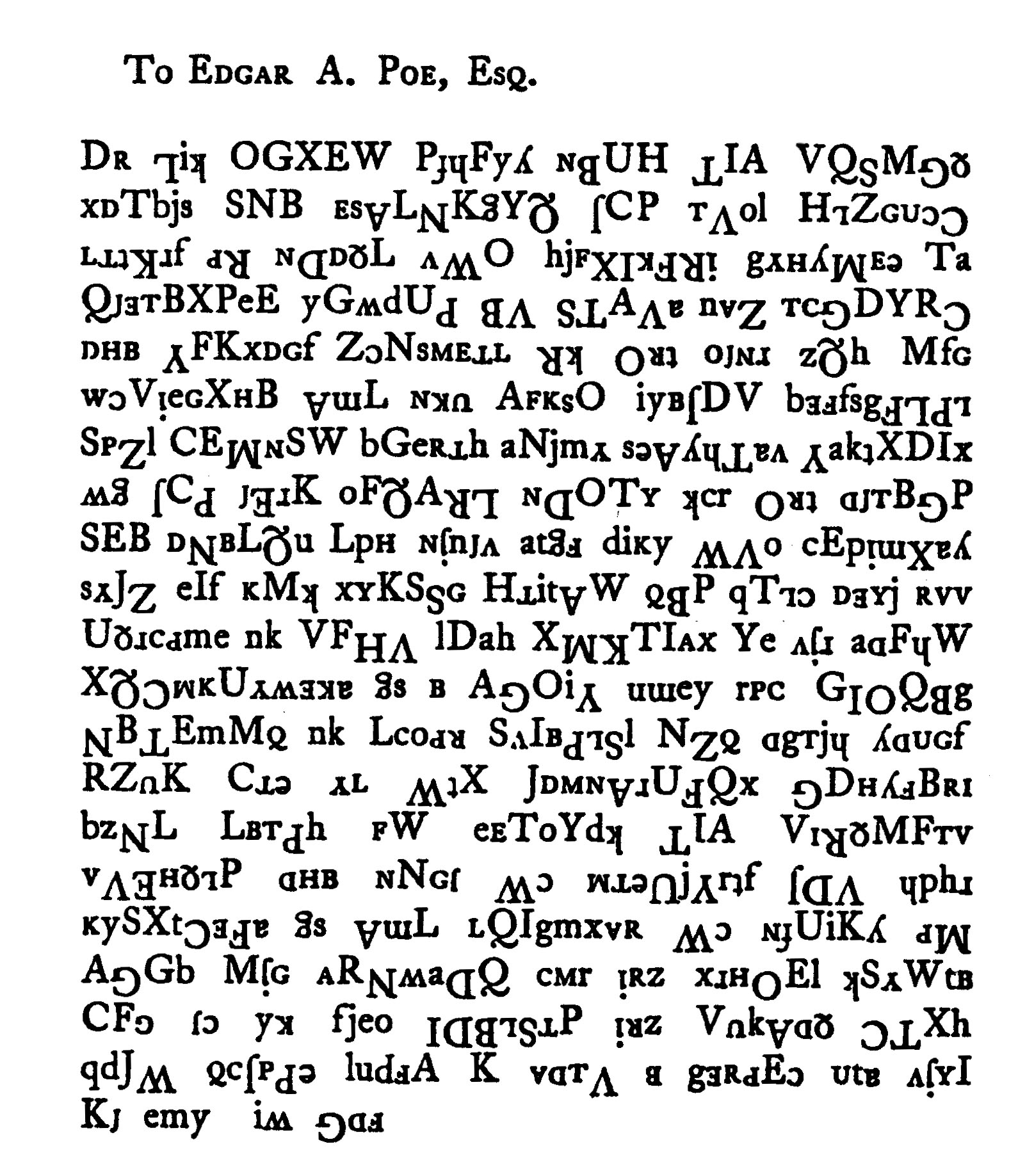

See also Cryptograms, Puzzles and Conundrums from Alexander’s Weekly Messenger
Kevin McLauglin, "Distraction in America: Paper, Money, Poe," in Paperwork: Fiction and Mass Mediacy in the Paper Age, 29-49; 128-35.
Marc Shell, "The Gold Bug," in Money, Language, and Thought: Literary and Philosophic Economies from the Medieval to the Modern Era (1993)
Shawn Rosenheim, "The King of `Secret Readers': Edgar Poe, Cryptography, and the Origins of the Detective Story," ELH, January 1989, (pp. 375-400).
Shawn Rosenheim, The Cryptographic Imagination: Secret Writings From Edgar Allan Poe to the Internet (1997)
W. K. Wimsatt, Jr. "What Poe Knew about Cryptography"
Poe, "Introduction," or the narrative frame of Poe's prose poem Eureka
Alexander Pope's Epistle to Bathurst
Sir Arhtur Conan Doyle, "The Adventure of the Dancing Men"
Sir Arhtur Conan Doyle, The Adventures of Sherlock Holmes: "The Dancing Men" (indebted to Poe's "The Gold Bug")
Classics Illustrated 15 Uncle Tom's Cabin
Uncle Tom's Cabin TV adaptation (1987)
"from that hour, your face seemed to be daguerreotyped on my memory."
Frederick Douglass, "The Heroic Slave"

October 26
REQUIRED READING
Poe, The Murders in the Rue Morgue, pp. 175-86
"Dupin" rhymes with "Fin" ("the end") in French. "Dupin" sounds like "Dupan." But the letter "n" is silent
Recommended:
How to say 'orangutan' in French?
Mrs. Gore (Catherine Grace Frances) "The Scrap-Stall" and "An Oddity of the Seventeenth-Century" in The Abbey: And Other Tales, Volumes 1-2
Sheridan Le Fanu, Passage In The Secret History Of An Irish Countess (apparently, the first locked room mystery)
Ernst Bloch, "A Philosophical View of the Detective Novel," Discourse Vol. 2, MASS CULTURE ISSUE (Summer, 1980), pp. 32-52. Also here.
Jorge Luis Borges,"The Detective Story" in On Writing can be read for free online here, pp. 491-99.
Unlocking the Crypt: Poe and Detective Fiction .4
October 28
REQUIRED READING
Poe, The Murders in the Rue Morgue, pp. 186-209
October 30
DIfFERnENt ASSIGNMENT (Dividing up the narrative structure and close reading.)
Required if you can:
Louis A. Renza, ‘Poe's Secret Autobiography,’ in The American Renaissance Reconsidered,
Ed. Walter Benn Michaels and Donald E. Pease (1985), esp. pp. 61-69
Recommended:
The Murders in the Rue Morgue Facsimile of the Ms.
Edgar Allan Poe, “The Murders in the Rue Morgue” [Text-01], “Johnston” manuscript, early 1841
Edgar Allan Poe, “The Murders in the Rue Morgue” [Text-02], Graham’s Magazine (Philadelphia, PA), vol. XVIII, no. 4, April 1841, pp. 166-179
Kevin McL]auglin, "Distraction in America: Paper, Money, Poe," in Paperwork: Fiction and Mass Mediacy in the Paper Age, 29-49; 128-35.
Double Indemnity (1944) 720pRecommended Reading and Viewing:
Arthur Conan Doyle, "The Musgrave Ritual" (1893)
Murders in the Rue Morgue (dir. Robert Florey, 1932)
Poe, “Maelzel's Chess Player”
W. K. Wimsatt, Jr., "Poe and the Chess Automaton" American Literature, May, 1939, Vol. 11, No. 2 (May, 1939), pp. 138-151
John T. Irwin, "Reading Poe's Mind: Politics, Mathematics, and the Association of Ideas in The Murders in the Rue Morgue" American Literary History, Vol. 4, No. 2 (Summer, 1992), pp. 187-206
Murders in the Rue Morgue (dir. Robert Florey, 1932)
Gaston Leroux, The Mystery of the Yellow Room Extraordinary Adventures of Joseph Rouletabille, Reporter,1908 locked room genre; cf. Murders in the Rue Morgue
Theodor Adorno, Aesthetic Theory, p. 20
Tzvetan Todorov, "The Typology of Detective Fiction," in The Poetics of Prose, trans. Richard Howard (Ithaca, N.Y.: Cornell University Press, 1977), 45
Poe's poems on cryptography, "An Acrostic," "Enigma," "A Valentine to," and "An Enigma."
November 2
REQUIRED READING
Poe, "The Purloined Letter," pp. 318-36
Recommended: The French Reception of Poe's Crypts:
Jacques Lacan and Jeffrey Mehlman, "Seminar on 'The Purloined Letter'" Yale French Studies No. 48, French Freud: Structural Studies in Psychoanalysis (1972), pp. 39-72
Jacques Derrida, "The Purveyor of Truth," Yale French Studies, 1975, No. 52, Graphesis: Perspectives in Literature and Philosophy (1975), pp. 31-113
Jacques Derrida, "Le facteur de la vérité" in The Post Card (trans. Alan Bass)
Barbara Johnson, "The Frame of Reference: Poe, Lacan, Derrida," Yale French Studies, 1977, No. 55/56, Literature and Psychoanalysis. The Question of Reading: Otherwise (1977), pp. 457-505
Quel qu’en ?oit le forfait, un de??ein ?i fune?te,
S’il n’e?t digne d’Atrée, e?t digne de Thye?te.
--Atrée & Thyeste. Tragédie Act V Scene v
Atrée et Thyeste / Atrée et Thyeste. tragédie de mondieur de Crébillon / Préface
Prosper Jolyot de Crébillon / Thyestes (Seneca)
November 4
REQUIRED READING
Poe, "The Purloined Letter," pp. 318-36
Recommended:


The Gift: a Christmas, New Year, and birthday present. MDCCCXLV
November 6
SORT OF REQUIRED:
E.T.A. HOFFMANN, "My Cousin's Window" (It anticipates "The Man of the Crowd" and is a good example of what Poe's contemporaries meant when faulted him for his "Germanism." It is also a capitivating and enthralling read. An earlier translation may be found here: E.T.A. Hoffman's, "My Cousin's Window" pp. 337-41.
Poe's first published tale, Metzengerstein, is a good example of Poe's "Germanism."

Spirits of the Dead is available on the Criterion Channel, linked here: Edgar Allan Poe . . . haunting anthology film."
Metzengerstein is adapted by Roger Vadim. Part of it has been used in a music video.
Walter Benjamin, "Some Motifs on Baudelaire" (section on Poe's Man of the Crowd)
Arthur Conan Doyle, A Study in Scarlet" in The Adventures of Sherlock Holmes
John T. Irwin, American Hieroglyphics, pp. 3-6; pp. 23-57
John T. Irwin, "Mysteries We Reread, Mysteries of Rereading: Poe, Borges, and the Analytic Detective Story," MLN Vol. 101, No. 5, Comparative Literature (Dec., 1986), pp. 1168-1215.
James Rosenheim and Stephen Rachman Shawn, Ed. The American Face of Edgar Allan Poe (1995)
Emron Esplin, "Borges’ Philosophy of Poe’s Composition," Comparative Literature Studies, Volume 50, Number 3, 2013, pp. 458-489.
MAURICE J. BENNETT, The Detective Fiction of Poe and Juan Luis Borges, "Ibn Hakkan Al-Bokhari - Dead In His Labyrinth" (1970)
November 9
REQUIRED READING:
Jorge Luis Borges, "Death and the Compass" in The Aleph and other stories, 1933-1969 : together with commentaries and an autobiographical essay Borges, Jorge Luis, Di Giovanni, Norman Thomas, trans., pp. 41-53.
Be sure to read this translation (pdf). Other translations contain gross errors. (Btw, "indivisible" is mistranslated as "invisible" in the last line). Thank you, Constanza Benedetti Kowalenko.
(Borges' version of Poe's PL, according to John Irwin, The Mystery to a Solution)
The original Spanish "La muerte y la brújula" may be found here: Ficciones, pp. 147-166
Fludd, Robert, 1574-1637 Utriusque cosmi maioris scilicet et minoris metaphysica, physica atque technica historia : in duo volumnina secundum cosmi differentiam diuisa
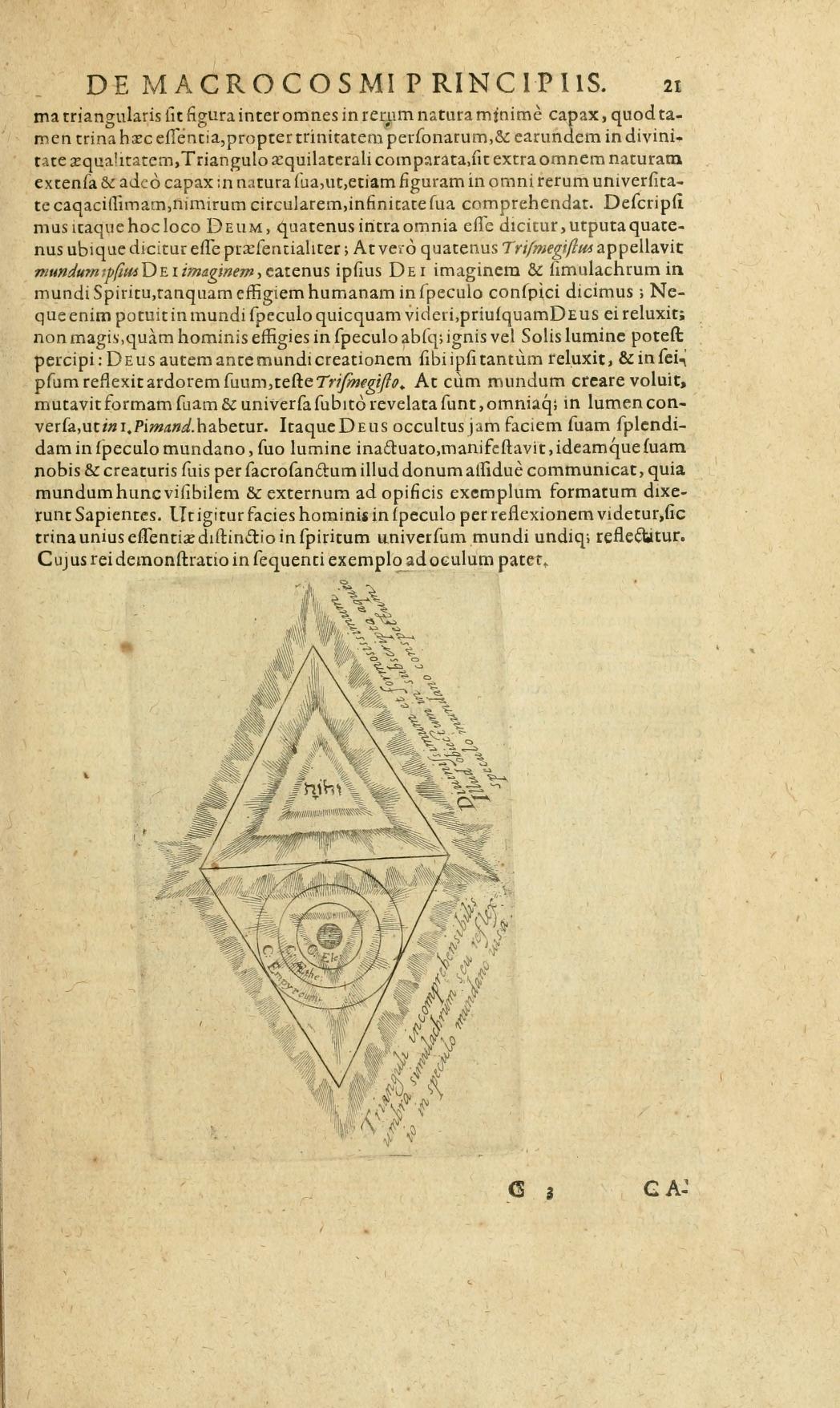
John T. Irwin, "Mysteries We Reread, Mysteries of Rereading: Poe, Borges, and the Analytic Detective Story," MLN Vol. 101, No. 5, Comparative Literature (Dec., 1986), p. 1193-94


November 11
HOLIDAY
Alfred J. Macadam, "Translation as Metaphor: Three Versions of Borges," MLN Vol. 90, No. 6, Comparative Literature: Translation: Theory and Practice (Dec., 1975), pp. 747-754
John P. Dyson, "On Naming in Borges's "La Muerte y la Brújula"" Comparative Literature Vol. 37, No. 2 (Spring, 1985), pp. 140-168
David A. Boruchoff, "IN PURSUIT OF THE DETECTIVE GENRE: "LA MUERTE Y LA BRUJULA" OF J. L. BORGES" INTI No. 21 (PRIMAVERA 1985), pp. 13-26.
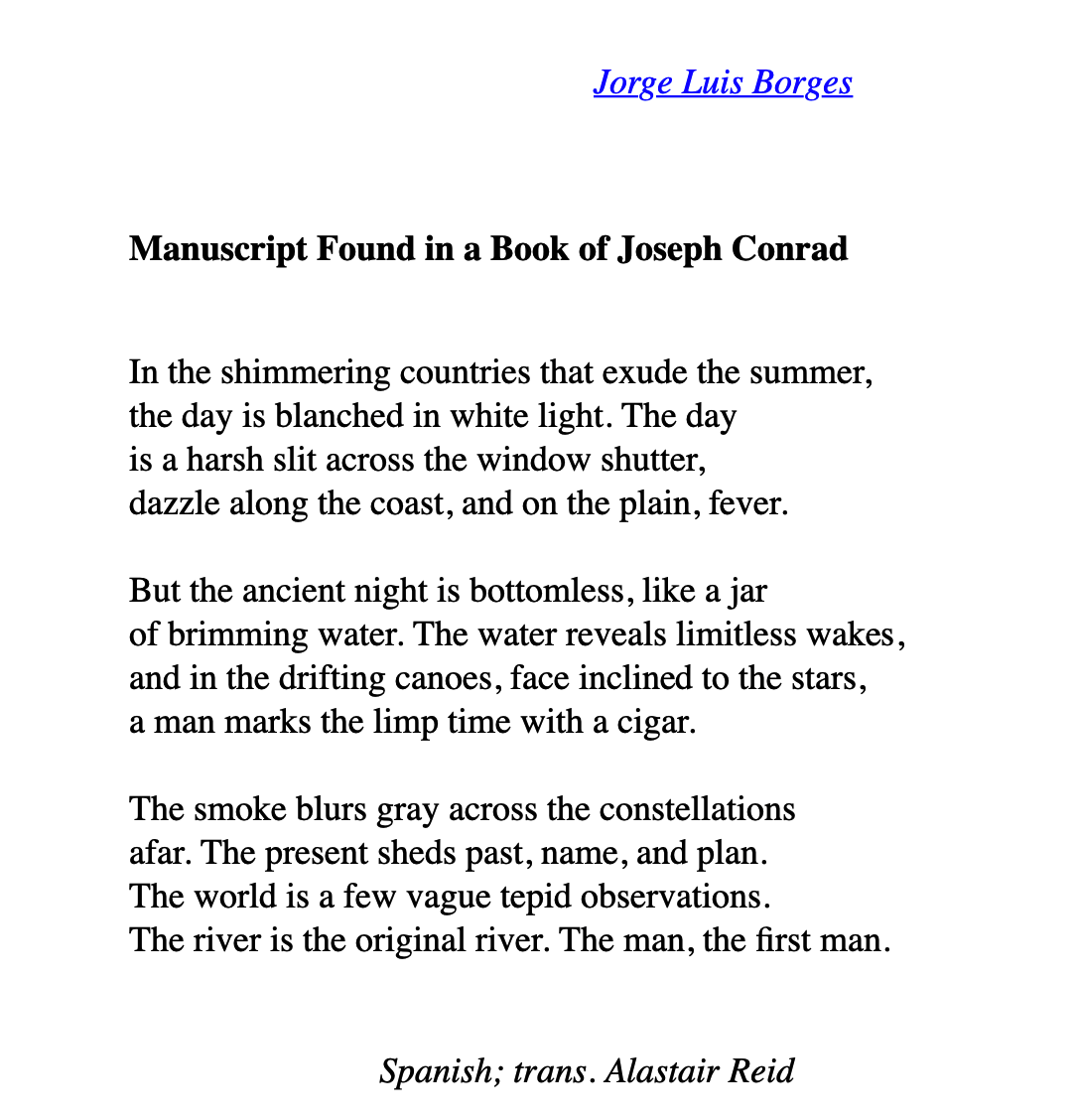
SECOND PAPER DUE BY 11:59 SATURDAY, NOVEMBER 14
DUE THURSDAY, November 12 by 5:00 p.m.: 2 DQs and 3 BIG WORDS
November 13
REQUIRED READING ?
Jorge Luis Borges, "The Garden of the Forking Paths," (Borges' version of Poe's MoftMR, according to John Irwin,The Mystery to a Solution) Read and compare the translation linked above in red translation with this less literal translation: Jorge Luis Borges, "Garden of the Forking Paths." Don't miss the single footnote / endnote. Thank you again, Constanza Benedetti Kowalenko.
The original Spanish "El jardín senderos que se bifurcan" may be found here in Ficciones, pp. 101-116
See also Jorge Luis Borges and Norman Thomas di Giovanni, The Garden of Branching Paths, pp. 85-98
Recommended:
"Ibn Hakkan Al-Bokhari Dead in his Labyrinth" (read aloud) or in this pdf (scroll down past "Death and the Compass") or online in The Aleph and other stories, 1933-1969 : together with commentaries and an autobiographical essay Borges, Jorge Luis, Di Giovanni, Norman Thomas, trans., pp. 75-84 (Poe's version of MintRM, according to John Irwin,The Mystery to a Solution)
Sir Arthur Conan Doyle, A Scandal in Bohemia The Strand Magazine, No. 7 Volume 2: Jul-Dec 1891, pp. 61-75 as a rewriting of Poe’s PL, only the letter is a photograph in Doyle's version.
See Poe, “On the Daguerreotype.”
Robert Ray, "Snaphots: The Beginnings of Photography," in How a Film Theory Got Lost?, 15-28
Jonathan Auberbach, "Poe's Other Double: The Reader in the Fiction," Criticism 24 (Fall 1982): 341-61
SECOND PAPER DUE BY 11:59 SATURDAY, NOVEMBER 14
LINK to LIVE GRADING
https://ufl.zoom.us/j/96538395602?pwd=aEFhdEwyY3ByQm1XT1puVmV5MkhnQT09
? DUE Sunday November 15 by 5:00 p.m: DQs and Three Big Words on Poe, "The Facts in the Case of M. Valdemar," pp. 337-50
November 16 Poe-tiques .6: The French Reception of Poe's Crypts Encore
REQUIRED READING
Poe, "The Facts in the Case of M. Valdemar," pp. 337-50
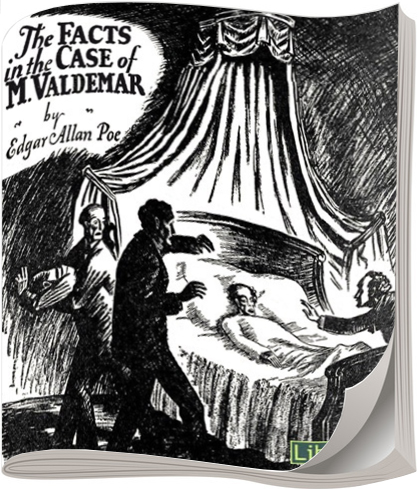
Recommended:
Adaptations of "The Black Cat" and "The Facts in the Case of M. Valdemar" in Two Eyes (dir. Dario Argento and George Romero, 1990)

Guy de Maupassant, "Night: A Bad Dream"
Roland Barthes, "Textual Analysis of Poe's Valdemar"
Jacques Derrida, "The Deaths of Roland Barthes."
Basil Rathbone reads Poe: The Facts in the Case of M. Valdemar
Guy de Maupassant, "Was It a Dream?" pp. 545-49
DUE Tuesday November 17 by 5:00 p.m: DQs and Three Big Words on Poe, "The Balloon Hoax"
November 18
REQUIRED READING
Poe, "Never Bet the Devil Your Head" (Dammit)
Recommended:
Poe, "The Balloon Hoax"
Robert Locke, "The Great Moon Hoax"
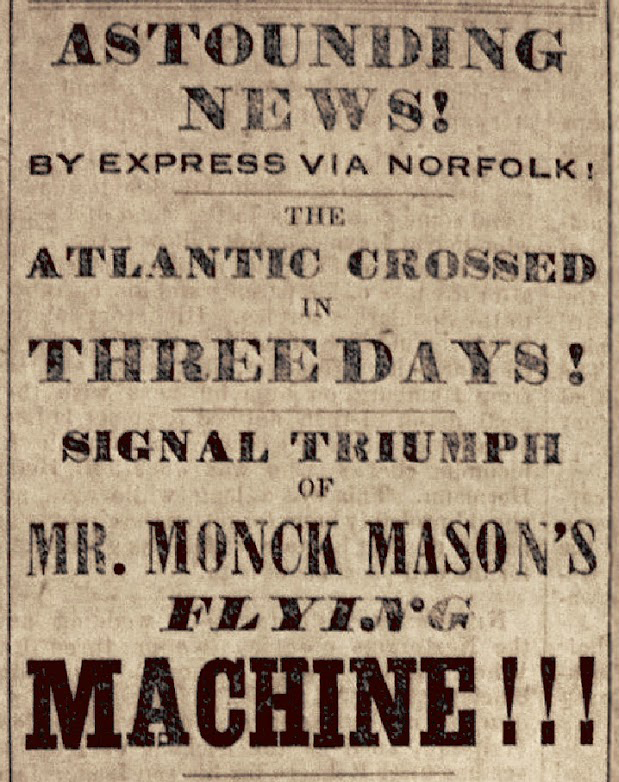

István Kornél Vida, "The "Great Moon Hoax" of 1835," Hungarian Journal of English and American Studies, Vol. 18, No. 1 (Spring-Fall, 2012), pp. 431-441
Poe, "The Unparalleled Adventure of One Hans Pfaall" (1835)
Poe, "A Tale of the Ragged Mountains"
?HEY EVERYBODY!!! DIfFERnENt ASSIGNMENT
DQS ARE DUE Thursday November 19 by 5:00 p.m: DQs and Three Big Words on The Narrative of Arthur Gordon Pym, pp. 3-48 in the Oxford World's Classics Edition (Or the preface to chapter VI in any other edition.)
I've divided the novel into short sections so we can actually read it. But I have had to add two Friday class discussions on November 20 and December 4 with DQs due the Thursdays before. If you would like to co-lead on either of those dates, please let me know.
November 20
The Narrative of Arthur Gordon Pym (1838), pp. 3-48 in the Oxford World's Classics Edition (Or the preface to chapter VI in any other edition.)
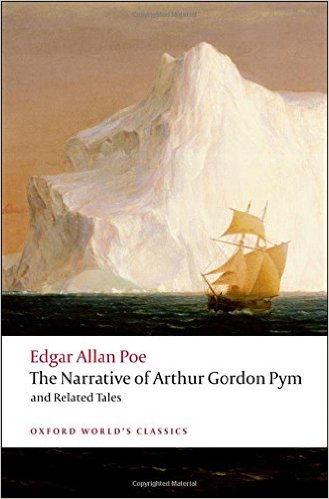
Recommended:
Digital Facsimile:
Edgar Allan Poe, Arthur Gordon Pym, Part I [Volume 3, Issue 1, Jan 1837; pp. 13-16] Southern literary messenger; devoted to every department of literature and the fine arts.
Diplomatic Transcription:
http://www.eapoe.org/works/tales/pyma01.htm
Digital Facsimile:
Poe, Edgar Allan, Arthur Gordon Pym, Part II [Volume 3, Issue 2, Feb 1837; pp. 109-116] Southern literary messenger; devoted to
Digital Transcription:
http://www.eapoe.org/works/tales/pyma02.htm
Cindy Weinstein, "Pym and Unreadability," The Oxford Handbook of Edgar Allan Poe, Ed. J. Gerald Kennedy and Scott Peeples (2019)
John Carlos Rowe, "Writing and Truth in Poe's The Narrative of Arthur Gordon Pym," Glyph: Johns Hopkins Textual Studies, 2 (I977), I02-2I. Reprinted as "Chapter Four: Writing and Truth in Poe's The Narrative of Arthur Gordon Pym," in Rowe's Through the Custom-House: Nineteenth-century American Literature and Modern Theory.
DUE Sunday November 22 by 5:00 p.m: DQs and Three Big Words on The Narrative of Arthur Gordon Pym, pp. 49-90 in the Oxford World's Classics Edition (Chapters VI to XI in any other edition.)
November 23 P.S. Poe's Re-inscryption .7 Ante-Bellum Poe
REQUIRED READING
The Narrative of Arthur Gordon Pym, pp. 49-90 in the Oxford World's Classics Edition ( Chapters VI to XI in any other edition.)
Recommended Again:
Cindy Weinstein, "Pym and Unreadability," The Oxford Handbook of Edgar Allan Poe Ed. J. Gerald Kennedy and Scott Peeples (2019)
John Carlos Rowe, "Writing and Truth in Poe's The Narrative of Arthur Gordon Pym," Glyph , 2 (I977), I02-2I. Reprinted as "Chapter Four: Writing and Truth in Poe's The Narrative of Arthur Gordon Pym," in Rowe's Through the Custom-House: Nineteenth-century American Literature and Modern Theory.
A Possible Source for Poe's Pym:
Porter, William Ogilvie; Porter, Jane, ed. Sir Edward Seaward's Narrative of his Shipwreck, and Consequent Discovery of Certain Islands in the Caribbean Sea 1831
Edgar Allan Poe, Vol.1 THE IMAGINARY VOYAGES. Edited by Burton R. Pollin.
Digital Facsimile:
Notes to 1902 James A. Harrison's 1902 Complete Works edition
Edgar Allan Poe, “South Sea Expedition,” Southern Literary Messenger, Vol. III, no. 1, January 1837, 3:68-72
J. V. RIDGELY AND IOLA S. HAVERSTICK, "Chartless Voyage: The Many Narratives
of Arthur Gordon Pym"
Captain Marryat, The Phantom Ship (1839)
November 25
Thanksgiving Break
November 27
Thanksgiving Break
Recommended:
Lisa Gitelman, "Arthur Gordon Pym and the Novel Narrative of Edgar Allan Poe"
Ki Yoon Jang, Edgar Allan Poe and the Author-Fiction: "The Narrative of Arthur Gordon Pym of Nantucket," Texas Studies in Literature and Language, Vol. 52, No. 4 (WINTER 2010), pp. 355-380
Richard Kopley, ed. Poe's Pym: Critical Explorations (1992)
Andrew Horn, "'But to Return From This Digression. . .': The Functions of Excursus in Edgar Allan Poe's Narrative of Arthur Gordon Pym" Communiqué, 11 (1986), 7–22.
DUE Sunday November 29 by 5:00 p.m: DQs and Three Big Words on The Narrative of Arthur Gordon Pym, pp. 90-130 (Chapters XI to Chapter XVIII in any other edition).
November 30
The Narrative of Arthur Gordon Pym, pp. 90-130 (Chapters XI to Chapter XVIII in any other edition). The Journal Returns!!
Pym's journal, the journal he says he didn't keep, is mentioned or appears on pp. 2-3; 55; 94-5; 98; 130 with footnote; 172 with footnote.
In the Oxford edition, J. Gerald Kennedy (p. 188n.108) says that "many details" of chapter XV are taken from Benjamin Morrell, A Narrative of Four Voyages To the South Sea, North and South Pacific Ocean, Chinese Sea, Ethiopic and Southern Atlantic Ocean, Indian and Antarctic Ocean (1832) On p. 120, Pym quotes two "extracts" from Morrell's Narrative.
Kennedy (p. 288n.120) also says that parts of chapter XVI are taken from the writings of Captain Jeremiah N. Reynolds. Kennedy is probably referring to Address on the Subject of a Surveying and Exploring Expedition to the Pacific Ocean and South SeasDelivered in the Hall of Representatives on the Evening of April 3, 1836 Poe reviewed it and ended by quoting two extract: Edgar Allan Poe (ed. J. A. Harrison), “Review of Address on the Subject of a Surveying and Exploring Expedition to the Pacific Ocean and South Seas,” The Complete Works of Edgar Allan Poe — Vol. IX: Literary Criticism - part 02 (1902),
Pym quotes Reynolds on p. 122.
Aubrey Starke, "Poe's Friend Reynolds," American Literature, Vol. 11, No. 2 (May, 1939), pp. 152-159
WASHINGTONII VITA Posthumously published
.
Recommended:
Compare the length of entries by Robinson Crusoe's journal in Daniel Defoe's The Life and Adventures of Robinson Crusoe. Thank you, Megan!
DQS ARE DUE Thursday December 1 by 5:00 p.m on The Narrative of Arthur Gordon Pym, pp. 130-170 in the Oxford World's Classics Edition (Chapters XVII to XXIV in any other edition)
December 2
REQIRED READING
The Narrative of Arthur Gordon Pym, pp. 130-170 in the Oxford World's Classics Edition (Chapters XVII to XXIV in any other edition)
HEY EVERYBODY!!! DIfFERnENt ASSIGNMENT
DQS ARE DUE Thursday December 3 by 5:00 p.m: DQs and Three Big Words on The Narrative of Arthur Gordon Pym, pp. 170-78 in the Oxford World's Classics Edition (Chapter XXV to the end of the novel, including the "Note" in any other edition)
December 4
REQIRED READING: Who published this posthmumous novel and wrote the note?
The Narrative of Arthur Gordon Pym, pp. 170-78 in the Oxford World's Classics Edition (Chapter XXV to the end of the novel, including the "Note" in any other edition)
Recommended:
Fossils as writing in Jules Verne's Journey to the Center of the Earth
DQS ARE DUE Sunday December 6 by 5:00 p.m: DQs and Three Big Words on Poe's Eureka: A Prose Poem, pp. 1-16
December 7
REQIRED READING
The Narrative Frame of Poe's Eureka: A Prose Poem, pp. 1-16

Recommended:
Barton Levi St. Armand, "'Seemingly Intuitive Leaps': Belief and Unbelief in Eureka," in Poe as Literary Cosmologer: Studies on Eureka, A Symposium, ed. Richard P. Benton (Hartford, Conn., 1977)
Best DQs of the semester!!! Nominations close December 8 by 11:59 p.m. for the student you think wrote the best DQs of the semester, quoting one of their DQs as an example. Send me your nominations to my gmail address.
THIRD PAPER DUE BY THE BEGINNING OF CLASS December 9
Word Count: 50-100 words. Which two of three Poe tales or poems or novel would you want to compare that are not commonly linked together and why?
DQS ARE DUE Tuesday December 8 by 5:00 p.m: DQs and Three Big Words on Poe, The Thousand-and-Second Tale of Scheherazade
December 9
POESCRYPTS "NEVER MORE"?
REQUIRED READING:
Poe, The Thousand-and-Second Tale of Scheherazade
This might have happend. But it will not have happend.
Each student will make up two or more somewhat difficult questions about everything we've read and watched in this clas. The rest of us will use emoticons to judge how good the questions are based on how easy or difficult they are. Grade based on percentages of emoticons. No ciphers are necessary.
NOTHING BELOW IS REQUIRED
Poe, Duchamp, the hoax, the readymade
T. J. Clark , All the Things I Said about Duchamp: A Response to Benjamin Buchloh
October , Winter, 1995, Vol. 71, feminist issueS (Winter, 1995), pp. 141-143
Sianne Ngai, Chapter 2 of Theory of the Gimmick (2020)
Poe, "The Domain of Arnheim"
Recommended:
Errol Morris on "The Domain of Arnheim"
The Domain Of Arnheim 1962 by Rene Magritte
Detail of 'The Domain of Arnheim'
Go to Domain of the Arnheim for the story and Magritte's painting.



Gustav Gruener, Notes on the Influence of E. T. A. Hoffmann upon Edgar Allan Poe
The Devil's Elixir. From the German of E.T.A. Hoffmann
(and "William Wilson")
On the Supernatural in Fictitious Composition, and in Particularly in the works of E.T.A.Hoffmann
LEWIS A. LAWSON, "Poe's Conception of The Grotesque," The Mississippi Quarterly Vol. 19, No. 4 (FALL 1966), pp. 200-205
Hoffmann, "The Sand Man" and "The Black Cat"
In "The Code for Gold: Edgar Allan Poe and Cryptography," Terence Whalen maintains he has found an ecrypted message in the W.B.Tyler letter no one before him has solved. In a brillant essy on Poe and secrey published in 1985, Louis Renza~ attributed the Tyler letter to Poe. John Hodgson~~ followed in Renza's footsteps in an article published in 1993 identying the decoded source of the message in Joseph Addison's Cato. A year later Terence Whalen annouced that the Tyler letter was not only written by Poe but contained a cryptogram that he, Whalen,was the first to decode. "If Rosenheim and Renza are correct, the resulting message constitutes a text which Poe never intended to reveal."https://www.jstor.org/stable/pdf/292
~Terence Whalen, "The Code for Gold: Edgar Allan Poe and Cryptography," Representations, Spring, 1994, No. 46, pp. 35-57
~~ Louis A. Renza, ‘Poe's Secret Autobiography,’ in The American Renaissance Reconsidered,
Ed. Walter Benn Michaels and Donald E. Pease (1985), esp. pp. 61-69
~~~John A. Hodgson, "Decoding Poe? Poe, W. B. Tyler, and Cryptography"; also Tomokiyo, S. (2015, January 7). Solution of Tyler’s Cryptograms in Poe’s Article, from http://cryptiana.web.fc2.com/code/poe2.htm#SEC1 and DEREK BRUFF Episode 32 – W. B. Tyler DECEMBER 13, 2019 and Cipher Solved, But Mystery Remains and Who Was W.B. Tyler?
Whalen thinks Poe wanted to preserve a distinction between his private, secret, nevr to be revealed writing from Poe's published tales to be read openly by a community of more less vulgar and incompetent mob of readers. Whalen shows Poe failed to keep the first Tyler cipher a secret.
But what happens to this theory, or to any theory predicated upon deferred or absent meaning, if a mode of secret writing fails to conceal its message from public readers? In order to answer this question, I have decoded the cryptogram.
The soul secure in her existence smiles at the drawn dagger and defies its point. The stars shall fade away, the sun himself grow dim with age and nature sink in years, but thou shalt flourish in immortal youth, unhurt amid the war of elements, the wreck of matter and the crush of worlds.

[Whalen solved the second of two ciphers sent to Poe by W. B. Tyler. / Who Was W.B. Tyler?

[R. Burt, Ed. note: the decoded lines are from Joseph Addison's Cato Act V scene 1. [Hidgdon identified them, and Whalen revised the essay when published as a chapter in his book, Edgar Allan Poe and the Masses (1998).] Whalen does not identify Addison's play as the source of the quotation but says it is "essentiallly a new Poe text." He earlier refers to it as "a hitherto unsolved Poe cryptogram" (35).
Whalen thinks he has found a "new Poe text":
The second mystery concerns the messages encrypted in the Tyler letter. In what follows, I will show that one of the ostensibly perfect codes can in fact be broken.
As far as I have been able to determine, this is the first time that the crypto-graph has been solved, so the message constitutes what is essentially a new Poe text.
The quotation remains encrypted, however. It has to be recognized as such and it source found, as if the cryptogram contained a buried treasure, the deciphered quotation. Whalen does not consider the deciphered text is corrupt. To be read, Whalen to edit and emend it.] As far as I have been able to determine, this is the first time that the crypto-graph has been solved, so the message constitutes what is essentially a new Poe text" (43-44). Perhaps for Poe, crytography involves textual corruption much like "Bishop's Hotel" is a corruption of "Bishop's hostel" and "Bishop" is a corruption of "Bessup," Legrand thinks.* Crucially, the elder negress informs Legrand that "Hostel"** is a corruption of "Castle." By contrast, Legrand's note to the narrator*** and the rumor**** about Kidd's buried treasure are not corrupted. In short, the code Whalen cracks produces, even when emended, an unreadable text: is it a plagiarized quotation or is it a deliberately and sufficently corrupted quotation to be considered Poe's?
If the encrypted "message" in the Tyler letter is a "new Poe text," that text is a quotation by Poe and has be read as such. Yet Poe's encrryption of a quotation without quotation marks make it difficult to know what one is reading and who wrote it. Perhaps Poe plagiarized the quotation from Addison. Perhaps Poe just copied Addison's lines badly. It is difficult to imagine, however, that Poe did not intentionally corrupt the encrypted quotation, it missing signature. If o, how are we to read them? Do the corruptions ineffectively mask the source? Or do they constitute Poe's rewriting of it? Is it "essentially" a new Poe text, as Whalen put it, the essence of Poe's text including encrypted texts Poe technically did not write but did not plagiarize either since he hid the cryptogram so effectively that no identified it until Whalen did? Is the encryption itelf part of the text, the cryptogram serving as wrapping as golden as the golden text? Are we talking "Gold Bug Fever," a feer every reader contracts and carries without knowing it? Because any cryptograph has to pass through language transmitted on graphic support and orally?
* "Bishop's Hotel'; for, of course, I dropped the obsolete word 'hostel.'"
** Legrand's substitution of "Bessup" for "Bishop" is not based on reason: "it entered into my head, quite suddenly, that this 'Bishop's Hostel' might have some reference to an old family, of the name of Bessop." Furthermore, the cipher is not a map. The memory of the elder negress serves in place of one: "one of the most aged of the women said that she had heard of such a place as Bessop's Castle."
*** Even the note presents a problem of narration. I have bolded it in the quotation below.
"Did you bring any message from Mr. Legrand?"
"No, massa, I bring dis here pissel;" and here Jupiter handed me a note which ran thus:
My DEAR --
Why have I not seen you for so long a time? I hope you have not been so foolish as to take offence at any little brusquerie of mine; but no, that is improbable.
Since I saw you I have had great cause for anxiety. I have something to tell you, yet scarcely know how to tell it, or whether I should tell it at all.
I have not been quite well for some days past, and poor old Jup annoys me, almost beyond endurance, by his well-meant attentions. Would you believe it? --he had prepared a huge stick, the other day, with which to chastise me for giving him the slip, and spending the day, solus, among the hills on the main land. I verily believe that my ill looks alone saved me a flogging.
I have made no addition to my cabinet since we met.
If you can, in any way, make it convenient, come over with Jupiter. Do come. I wish to see you tonight, upon business of importance. I assure you that it is of the highest importance.
Ever yours,
WILLIAM LEGRAND.
**** Legrand is something of an oral historian: "Well; you have heard, of course, the many stories current --the thousand vague rumors afloat about money buried, somewhere on the Atlantic coast, by Kidd and his associates. These rumors must have had some foundation in fact. And that the rumors have existed so long and so continuously could have resulted, it appeared to me, only from the circumstance of the buried treasure still remaining entombed. Had Kidd concealed his plunder for a time, and afterwards reclaimed it, the rumors would scarcely have reached us in their present unvarying form." (my emphasis) The monetary currency depends on the currency of the rumors. And although there are a thousand vague rumors afloat," they effectively carry exactly the same message in thousand of different floating bottles.
This is the second cipher Tyler sent to Poe (or Poe "sent" to himself). It was broken in 2000 by Gil Broza using a computer.

On textual corruption in accounts of the transmission of Tyler / Poe's ciphers
The cipher printed below approximates Tyler's version with symbol sets defined by Zapf Dingbats?. It varies somewhat from the original text printed in Graham's Magazine (December 1841), but in cryptography the appearance of symbols matters less than their sequence and diversity. Rosenheim reprints the cryptograph, but the first three lines are unaccountably omitted (379), a mistake left uncorrected in succeeding issues of ELH. The Tyler letter is also reproduced in The Complete Works of Edgar Allan Poe (14:144), but readers should be aware that there is an error, hitherto unnoticed, in the standard edition of Poe's works. In The Complete Works, line 5 of the cryptograph appears as follows: OD 1 $1 [ ? ( ,; ? t et I t ? ? : ( t [ t [ $1 ? t ] Between the marked characters ("[" and "?"), the typesetter dropped three symbols from the original Graham's text. The line should read: OD I $ [ I $ [ ? ( ,; ? t VW t I t ? ? : ( t I t [ $ ? t ]: For convenience I have retained the line breaks from the standard edition. The corrected cryptograph is printed below; it duplicates the original version from Graham's Magazine except for
Terence Whalen, "The Code for Gold: Edgar Allan Poe and Cryptography," Representations, Spring, 1994, No. 46, pp. 35-57
Broza’s solution revealed that the original cipher had over two dozen mistakes introduced by the typesetters or the encipherer. Many of these were trivial (such as “warb” for “warm,” “shaye” for “share,” “langomr” for “langour”), but even after Broza corrected obvious errors, the final plaintext is sometimes garbled:
It was early spring, warm and sultry glowed the afternoon. The very breezes seemed to share the delicious langour of universal nature, are laden the various and mingled perfumes of the rose and the –essaerne (?), the woodbine and its wildflower. They slowly wafted their fragrant offering to the open window where sat the lovers. The ardent sun shoot fell upon her blushing face and its gentle beauty was more like the creation of romance or the fair inspiration of a dream than the actual reality on earth. Tenderly her lover gazed upon her as the clusterous ringlets were edged (?) by amorous and sportive zephyrs and when he perceived (?) the rude intrusion of the sunlight he sprang to draw the curtain but softly she stayed him. “No, no, dear Charles,” she softly said, “much rather you’ld I have a little sun than no air at all.”
--The E. A. Poe Cryptographic Challenge has been solved.
From Edgar Allan Poe, “Our Puzzles Once More,” Alexander’s Weekly Messenger, February 26, 1840, p. 4, col. 3-5 and p. 2, col 4"
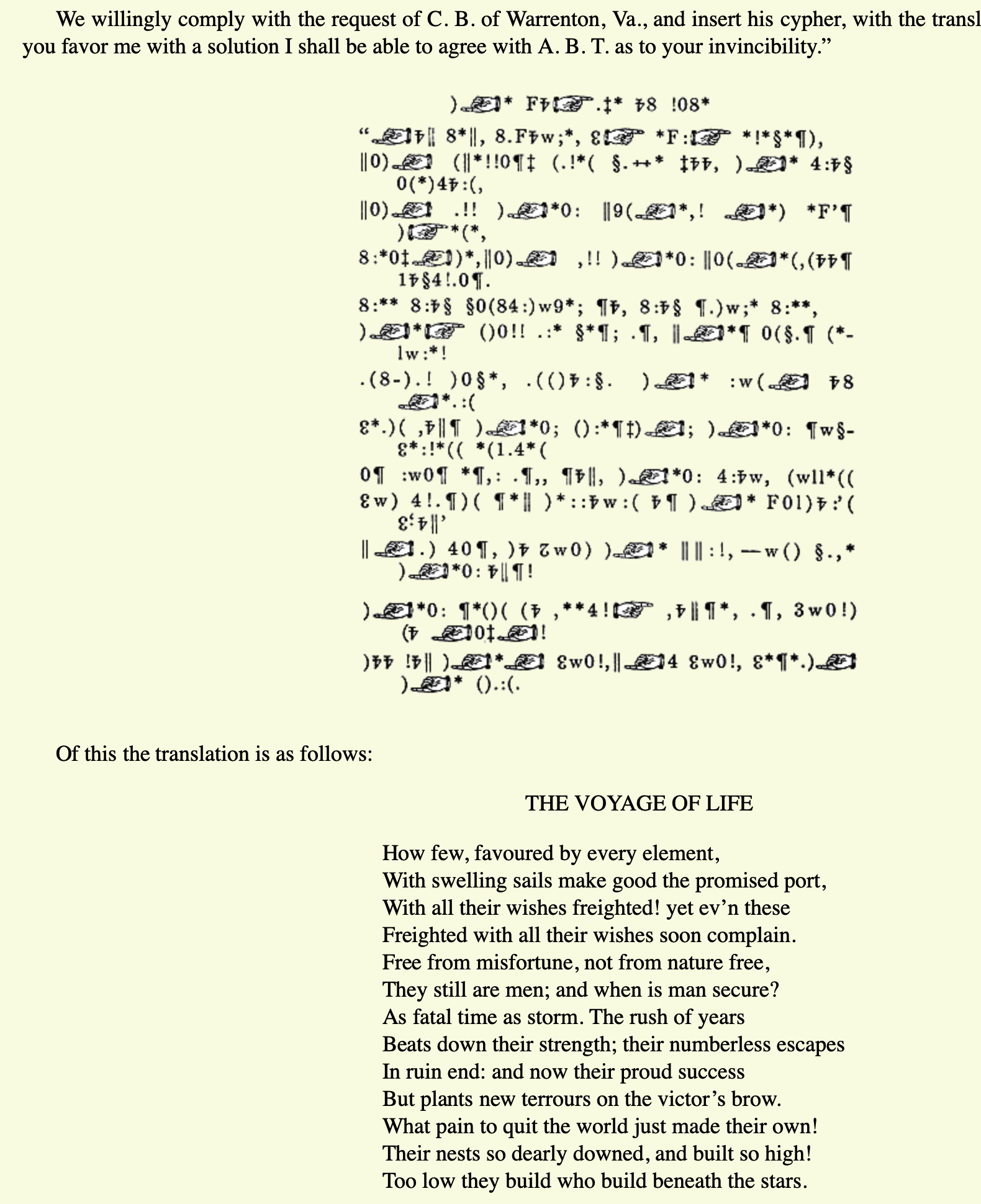
"But the advocates of this horrid, this wretched, this barbarous custom, have the audacity to tell us it is the only genuine production, the only real means by which we can effect a cure, and have a tendency to deter the wicked from trespassing on my corn crib, and to stop the penetration of crime in the custom house. Now I would ask such clerks what is the amount of salary, the men why so many days ago were caught in the very act of committing suicides in our prisons, and when interrogated as to the cause, and why so much precaution to guard our good ship Constitution, and to prevent self-murder on the quarter deck, or be bound in chains in our cells of solitary confinement, without the most distant hope of relief — hurrah — hurrah — hurrah for Liberty! to commence with five, six, seven, or even eight as the case may be all the year round? It can be answered on no other principle than electricity. No other ground than red clay with sandy bottom is fit for apothegms — this, that the brain of the mammoth is kept in a continual state of turmoil — the sufferer is distracted by his own foibles, his own whims and nonsense, his intolerable loquacity — thus needlessly disturbing himself until out of existence, and seeks relief in the arms of Morpheus, or slumbers in death, to wake no more until time and death shall be no more thus proving conclusively that this is a probationary state that death is preferred by the brave and free to a life in slavery, to a life of solitary wandering in a trackless desert, is 10,000 confinement by those who are used to the chambers of luxury, and are best able to judge of their own imaginary wants.
The words in italics were italicised by ourselves, and did not so appear in the original. By reading these words alone, the true meaning of this queer piece of composition is discovered. How we were enabled to pick out the precise words which are to be read, is a question we will not answer just now. It is sufficient that our correspondent will acknowledge that his cypher is read.
T. R. H. or J. R. H. (we cannot make out the first letter precisely) of Philadelphia, will pardon us for not undertaking the solution of his puzzle as it stands; for he has evidently misunderstood our whole design. He says that he has made a bet upon our infallibity; and that he may safely do, provided always that he sticks to the matter in hand. We said, distinctly, that we would read any English writing, where arbitrary marks are used in place of the common alphabetical characters — for example, an alphabet is first made in which a * represents a, a t b, a ~ c, &c &c — this alphabet is then employed as the ordinary one would be. The same character must always stand for the same letter. Now if J. R. H. will take the trouble to count the various distinct characters employed by him, he will find there are no less than fifty-one. But there are only twenty-six letters in the English alphabet. He can get his MS. again by applying at our office. In the meantime let him concoct another puzzle, in accordance with our conditions, and bet as much as he pleases upon our solving it. The present bet is a drawn one of course, as there was a misunderstanding."
We had scarcely glanced at this affair when we pronounced it an imposition, notwithstanding Mr. K’s assertion to the contrary. In the first place, had it been “a genuine article,” it would not have been written in as free and running a hand as it is — a hesitation would have been apparent about the characters. In the second place, there is no word in the English language which ends as Mr. K’s word “Vsmukkss” does — that is to say with double-duplicate letters. But the same method which serves us in the decyphering a true cypher, will enable us to demonstrate the falsity of any fictitious one. It may afford our friends some amusement to follow us in the process of a demonstration in the present case.
The reader will observe that we have italicised three words in the cypher, and upon these three depends all we have to say.
Either Mr. Kulp’s puzzle is not genuine, or mw stands for to, mlw for tho’, and laam for hoot. But it is evident that this latter cannot be for in that case both w and a represent the letter o. What follows? — why that Mr. Kulp’s puzzle is no puzzle at all. This demonstration is as absolutely conclusive as any mathematical one could be. The process of reasoning here employed is that employed also in the solution of the cyphers.
D. D’s cypher, of Irvinton, Ala., has this minute come to hand. He says we will “do to travel” if we read it — but it is a mere trifle — the letters being formed upon a square with diagonal crosses.
Life, like lovers, soon decays;
Our ardor soon is oer;
Very soon, alas, ‘t betrays
E’en hearts that blood not poore,
We give the verses verbatim and are not responsible for their merit.
“Munger’s” cypher is precisely like D. D’s; but, being in pencil, is too much defaced to be read.
Having thus gone through with the whole list of our enigmatical friends, it will be seen that we have done far more than merely redeem the pledge made at starting. We stated certain conditions, and these have seldom been observed. — In last weeks paper we decyphered a puzzle where the writer had actually used seven distinct alphabets in place of the one for which we stipulated. Just above, too, C. B. has run all his characters together without interval; but we made it a condition that the arbitrary letters should be used as the ordinary alphabet. We have been foiled in no instance.
It would have been better, perhaps, if our correspondents had always made use of their real names in sending their favor, and not of initials. Should we receive any thing upon this subject, hereafter, we cannot reply to it unless we have the writer’s true name. It will be observed that when a cypher is sent us with the writers initials only, no one can be sure, except the person himself and his immediate friends, that the puzzle is not a fiction of our own.
Upon second thought, we must decline giving our mode of solution for the present.
https://www.eapoe.org/works/misc/awm40c08.htm
--Edgar Allan Poe, “Our Puzzles Once More,” Alexander’s Weekly Messenger, February 26, 1840, p. 4, col. 3-5 and p. 2, col 4
In our next, we will oblige Philom with our method of solution.
https://www.eapoe.org/works/misc/awm40c07.htm
Edgar Allan Poe, “Our Puzzles — Again,” Alexander’s Weekly Messenger, February 19, 1840, p. 2, cols. 2-3
We offered, at the same time, by way of evidencing the sincerity of our belief upon the subject, to decypher any English letter sent to us thus written.
We certainly had no idea of the positive row which this challenge would create among all the Enigmatists and Charadists in the land. For the first week or so all went well. One or two very droll-looking hieroglyphical mysteries were sent us, and we gave their translation forthwith. In the meantime we were assailed in some quarters with the charge of gaggery, or more delicately speaking, of humbug. We were told to our teeth that the thing was impossible that we wrote our own puzzles and then solved them. Still we kept on the even tenor of our way, and translated every thing that was offered for translation. But the row increased as the wonder grew, and we find ourselves in a pretty predicament indeed. Do people really think that we have nothing in the world to do but to read hieroglyphics? or that we are going to stop our ordinary business and set up for conjurers? Will any body tell us how to get out of this dilemma? If we don’t solve all the puzzles forwarded, their concocters will think it is because we cannot — when we can. If we do solve them we shall soon have to enlarge our sheet to ten times the size of the Brother Jonathan.
Edgar Allan Poe, “Our Late Puzzles,” Alexander’s Weekly Messenger, February 12, 1840, p. 2, col. 5
We sympathise with our correspondent’s perplexity, and hasten to remove it — especially as we have a penchant for riddles ourselves. In spite of the anathemas of the over-wise, we regard a good enigma as a good thing. Their solution affords one of the best possible exercises of the analytical faculties, besides calling into play many other powers. We know of no truer test of general capacity than is to be found in the guessing of such puzzles. In explanation of this idea a most capital Magazine article might be written. It would be by no means a labor lost to show how great a degree of rigid method enters into enigma-guessing. So much is this the case, that a set of rules might absolutely be given by which almost any (good) enigma in the world could be solved instantaneously This may sound oddly; but is not more strange than the well known fact that rules really exist, by means of which it is easy to decipher any species of hieroglyphical writing — that is to say writing where, in place of alphabetical letters, any kind of marks are made use of at random.*
The method of which we speak enables us to say at once, in regard to our correspondent’s enigma, that he has puzzled himself, and would have puzzled himself to all eternity, in vain. It has no answer. That is, it has no word of solution which will reply to allthe categories. The enigma is imperfect, and no doubt, composed by some ignorant person; one who, at all events, knew nothing of the laws of such compositions; for, like everything else, they have their laws. The style would indicate this ignorance sufficiently, without looking farther; but a little scrutiny fully exposes it. Still it is not difficult to perceive what the author intended as the answer — and this is light. The vulgar notions about light are embodied in the opening lines, and indeed throughout; while the “putting old frumps in a fidget at cards” &c. &c. plainly show the design.
[The following footnote appears at the end of the article, in column 2:]
* For example — in place of A put † or any other arbitrary character — in place of B, a * &c. &c. Let an entire alphabet be made in this manner, and then let this alphabet be used in any piece of writing. This writing can be read, by means of a proper method. Let this be put to the test. Let any one address us a letter in this way, and we pledge ourselves to read it forthwith — however unusual or arbitrary may be the characters employed.
25. Why ought the author of the “Grotesque and Arabesque” to be a good writer of verses?
Because he’s a poet to a t. Add t to Poe makes it Poet.
Edgar Allan Poe (?), “Enigmatical and Conundrum-ical,” Alexander’s Weekly Messenger, vol. 3, no. 50, December 18, 1839, p. 4, cols 1-2 This item was first attributed to Poe by Clarence S. Brigham in Edgar Allan Poe’s Contributions to Alexander’s Weekly Messenger, 1943, pp. 12-17. (See this article also for annotations.)
"The theme (the soul versus the wreck of matter) also appears in "The Conversation of Eiros and Charmion," "The Facts in the Case of M. Valdemar," and Eureka, adding further evidence to the case for Poe's authorship.
What Ostrom does not report is that Virginia often wrote back. On one occasion she even sent him a valentine containing her own experiment with secret writing, an acrostic poem that spells out Poe's full name with the initial letters of each line.22
22. The valentine poem is dated 14 February 1846; for a facsimile see Josephine Poe January, "Edgar Allan Poe's 'Child Wife,"' Century Magazine, new series 56 (1909): 894-96. Poe also composed a number of acrostic poems, including "Elizabeth," "An
Acrostic," "Enigma," "A Valentine to ," and "An Enigma. "
--Terence Whalen, "The Code for Gold: Edgar Allan Poe and Cryptography," Representations, Spring, 1994, No. 46, pp. 35-57
Poe, "An Acrostic," "Enigma," "A Valentine to," and "An Enigma."
"A Few Words on Secret Writing," Graham's Magazine, July 1841; reprinted in Works, 14:114-49. Between July and December 1841, Poe wrote four articles on cryptography for Graham's; the entire series is reprinted (with errors discussed below) in The Complete Works of Edgar Allan Poe, ed. James A. Harrison, 17 vols. (New York, 1902; 1965), 17:61.
TERENCE WHALEN, Edgar Allan Poe and the Masses: The Political Economy of Literature in Antebellum America (1999)
https://www.jstor.org/stable/pdf/2928778.pdf
Poe and Mrs. Whitman in The Century Magazine v.77 1908-09.
4 "Reductive and Expansive Language: Semantic Strategies in Eureka," Poe Studies, II (1978), I-2.
5 "Gold in the Bug," trans. Frank Towne, Poe Studies, 9 (1976), 36.
Barton Levi St. Armand's more traditional study, "Poe's Sober Mystification: The Uses of Alchemy in 'The Gold-Bug,'" Poe Studies, 4 (I97I), 1-7.
Classics Illustrated No. 64 Treasure Island
John A. Hodgson, "Decoding Poe? Poe, W. B. Tyler, and Cryptography" The Journal of English and Germanic Philology Vol. 92, No. 4 (Oct., 1993), pp. 523-534
Poe, Chapter on American Cribbage
https://www.jstor.org/stable/24298505?seq=1#metadata_info_tab_contents
Poe's review of Barnaby Rudge focuses on the detective-story plot
Poe, review of Charles Dickens, Sketzches by Boz / focuses on B lack Veils and Poe's review of The iPcikwick Papers fouses on Ms by a MadmanPoe's "Man of the Crowd" and Charles Dickens, Sketches by Boz, "The Street"--"Morning--"Night"--"Shops and their Tenants"--"Meditations on Monmouth Street"--"Gin Shops," 69-74, 74-80, 80-84, 213-20
Marc Shell, Paper Gold and Art as Representation and Exchange
POSTHUMOUS MEMOIRS OF HIS OWN TIME.Edgar Allan Poe (ed. J. A. Harrison), “Review of Posthumous Memoirs of His Own Time,” The Complete Works of Edgar Allan Poe — Vol. IX: Literary Criticism - part 02 (1902), 9:174-184
Giorgio Agamben_"Bartleby, on Contingency"
John T. Irwin, "Beating the Boss: Cain's "Double Indemnity"," American Literary History Vol. 14, No. 2 (Summer, 2002), pp. 255-283
N. Tom o' logical studies. The great tumble bug of Missouri, bent-on rollin his ball
Published by H.R. Robinson, 1837.

Henry James, The Art of Fiction
Horacio Silvestre Quiroga Forteza
"Stonehearst Asylum, previously known as Eliza Graves, is an American Gothic film directed by Brad Anderson and written by Joseph Gangemi. It is loosely based on the 1845 short story "The System of Doctor Tarr and Professor Fether" by Edgar Allan Poe."
A_DESCENT_INTO_THE_MAELSTROM_AESTHETICS_OF_SUBLIME.pdf
Mat Johnson, Pym: A Novel

The Cask of Amontillado comic
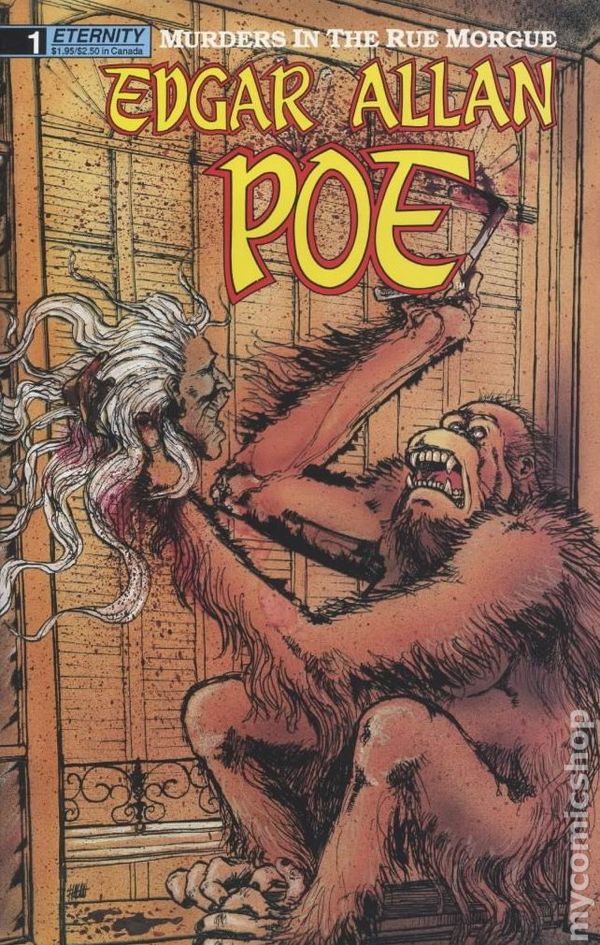
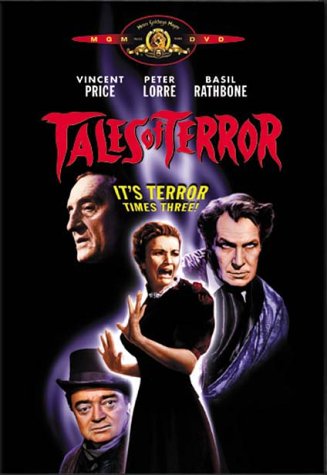
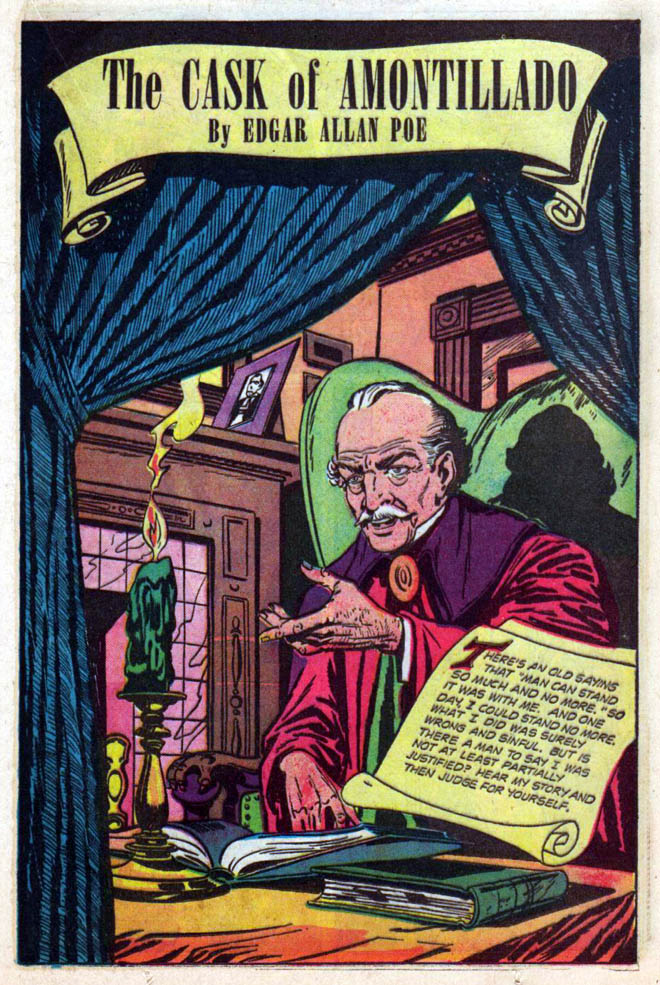

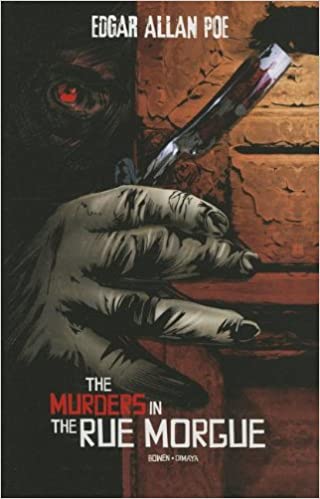
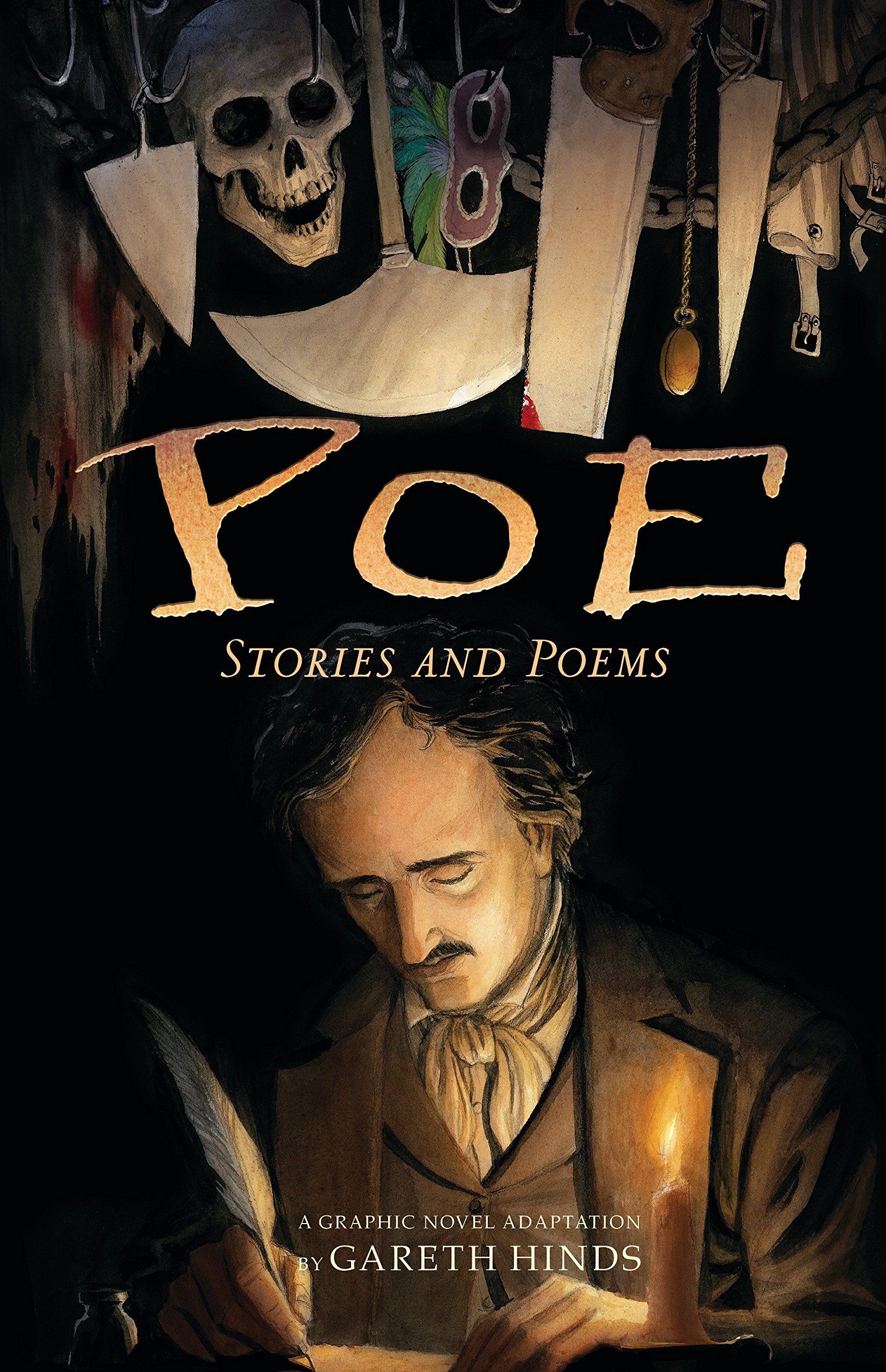
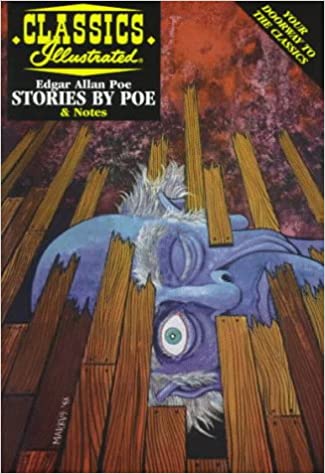
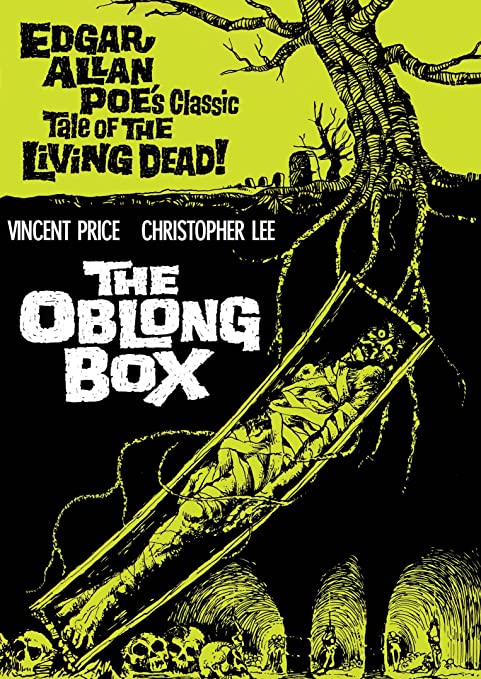


Please have your camera and audio turned on during class. If they are not on, expect to hear me calling on you.
General questions about literature and the arts: "WHY" did the writer do it this way? "HOW" did the writer do it? And "WHAT"did the writer do? This last question is the most important of the three. Graham's Magazine Vol XXXIV No. 5 May 1849
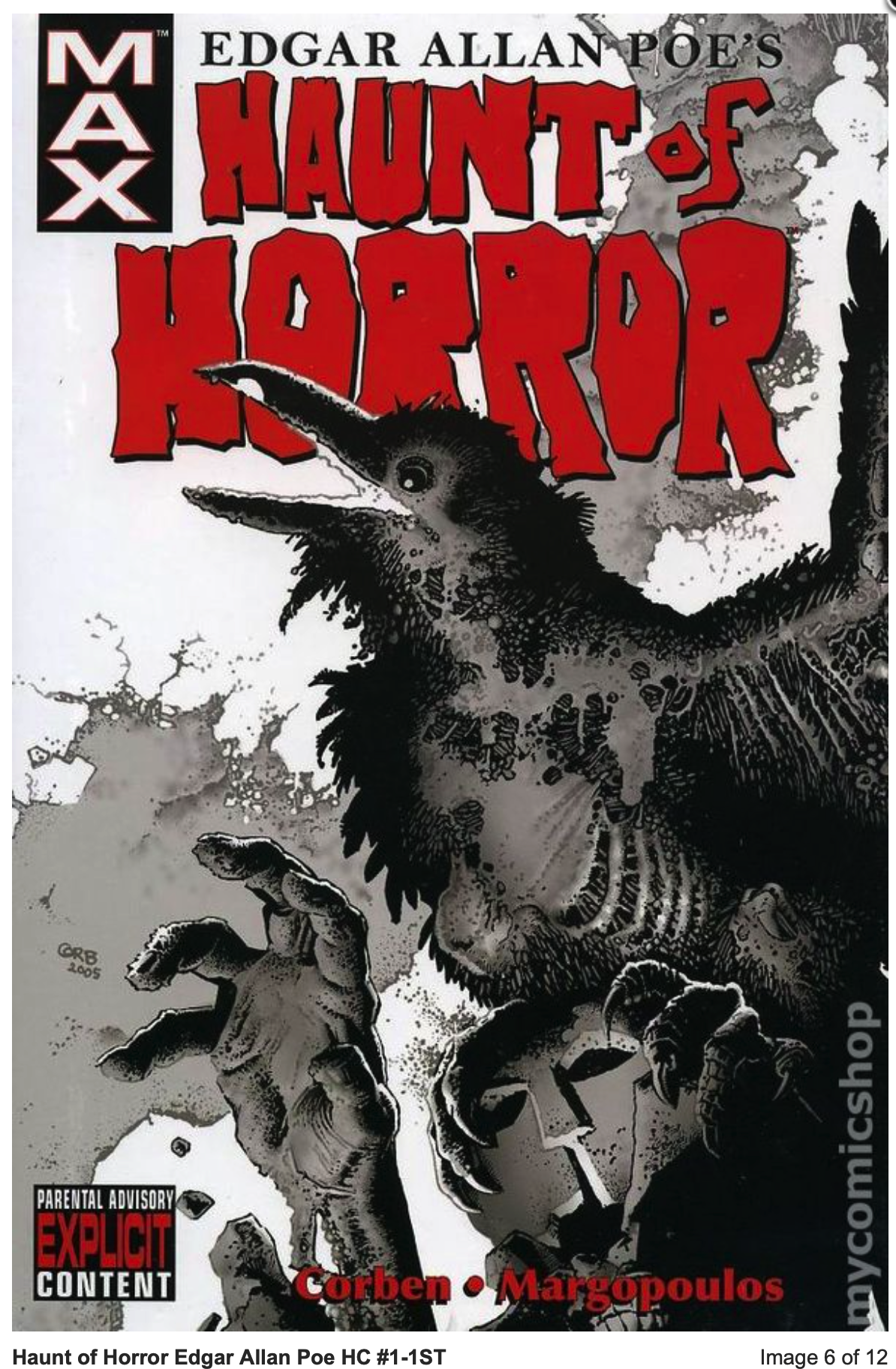
William Wordsworth, Preface to Lyrical Ballads (1802)
Peter Bell (Wordsworth)
Poe and the wounded, infirm, paralyzed, disabled body, dying body, and the living dead body.
A glossary of terms used in Grecian, Roman, Italian, and Gothic architecture
by Parker, John Henry, 1806-1884; Wordsworth, William, 1770-1850.
“Al Aaraaf” in, Al Aaraaf, Tamerlane and Minor Poems (1829), pp. 13-38
"Israfel"; "The Doomed City"; Preface "Letter to Mr ---B" in Poems by Edgar A. Poe (1831)
Poe, Phrenology
Poe stories concerned with phrenology:
“The Fall of the House of Usher”
"The Imp of the Perverse"
Madeleine B. Stern, Poe: "The Mental Temperament" for Phrenologists," American Literature May, 1968, Vol. 40, No. 2 (May, 1968), pp. 155-163
Phrenology
Edgar A. Poe , "Phrenology and Physiognomy"
L. Miles, Johann Gaspar Spurzheim, Franz Joseph Gall
Phrenology and the moral influence of phrenology: arranged . . . from the . . . Carey, Lea and Blanchard, 1835
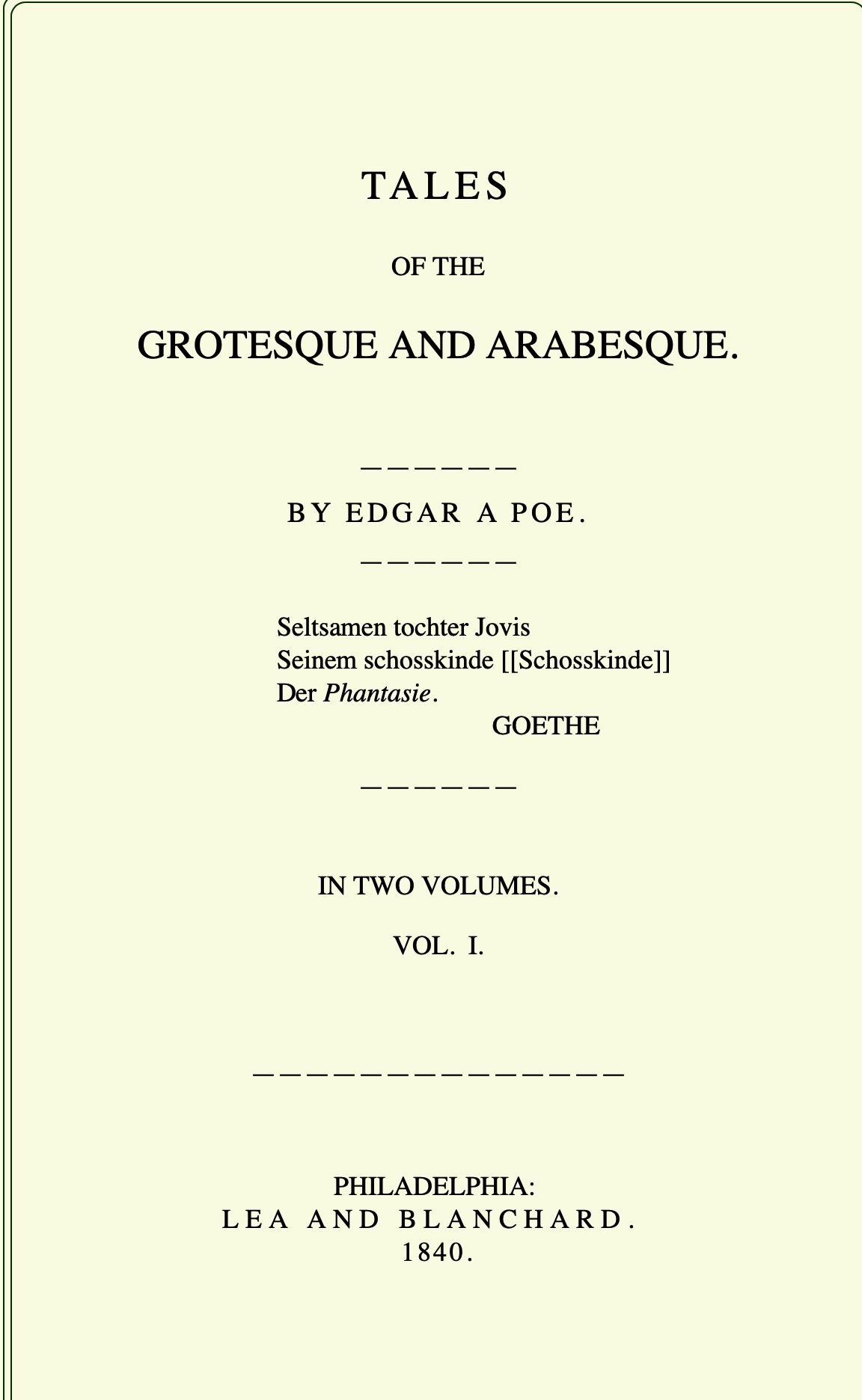
"The Lighthouse" Poe's last story
Charles Baudelaire's essay on Poe's life and works. Histoires extraordinaires. Traduites de Charles Baudelaire
(1884)Poe Bibliography (Anthomous Collection Tales of the Grotesque and Arabsque) (Posthumous Tales of Mystery and Imagination--several different editions with different tables of contents).
Poe Biography (Charles Griswold)
Life and letters of Edgar Allan Poe by Harrison, James Albert, 1903 New York, T. Y. Crowell & co
Poe, Edgar Allan, Tales of Mystery and Imagination London : J. M. Dent & sons, ltd.; New York, E. P. Dutton & co., inc. [1938]
Edgar Allan Poe, Tales Issue 1 1845
Sidney E. Lind, "Poe and Mesmerism"
PMLA Vol. 62, No. 4 (Dec., 1947), pp. 1077-1094
Poe dedicated Tales of the Grotesque and Arabesque to the anonymous author.
A Dream Within a Dream by Edgar Allan Poe
Poe Collections: Tales of the Grotesque and Arabesque (1840)
No complete edition of Poe's collected works has ever been published.
--Poe, Tamberlane and Other Poems
"Poe’s is the shakiest of all large American reputations, and yet, if I remember rightly a statement of Malcolm Cowley’s, there have been more studies of him than of any other native writer. There is, as Whitman said, an “indescribable magnetism” about Poe’s much romanticized life, and that would be part of the explanation. It is also true that Poe is an important point in any brief for Southern letters, that his supposed morbidity has attracted many diagnosticians of psychic and cultural sickness, and that some critics have been annoyed into writing about Poe by a desire to comprehend or explain away his high standing abroad. Finally, and on the whole recently, a number of people have attempted direct literary analysis of Poe, moved by a sense that there is more to him than obsession, mystification, and—as Yeats put it of “The Pit and the Pendulum”—“an appeal to the nerves by tawdry physical affrightments.”
Richard Wilbur, "The Poe Mystery Case," New York Review of Books, July 13, 1967
Precarious relation to the canon "Introduction: Beyond the 'Problem of Poe'," The American Face of Poe
Harsh criticism of Poe's poetry by Ralph Waldo Emerson and T.S. Eliot.
Jerome McGann introduction to Poe Alien Angel
Poe's more famous writings as children's literature.
Poe's literary reviews as "hatchet jobs" and "biting" satires.
Introduction to Poe Selected Tales(Penguin)
Poelarizing: Poe as underestimated (Rufus Wilmot Griswold; W.K. Wimsatt, "Poe and the Chess Automaton" ) and Poe as overestimated. Poe's Failures as Successes.
Lois Davis Vines, Poe Abroad: Influence, Reputation, Affinities (2002)
Guy de Maupassant, "Night: A Bad Dream"
What Is There to Love About Longfellow? | The New Yorker June 1, 2020
"Introduction" and Stanley Cavell, "Being Odd, Getting Even (Descartes, Emerson, Poe)" in The American Face of Edgar Allan Poe Ed. Shawn Rosenheim and Stephen Rachman (1995), pp. 3-36
Jerome McGann, The Poet Edgar Allan Poe: Alien Angel
Jerome McGann reads selected poems by Edgar Allan PoeAuberbach, Jonathan,The ROMANCE OF FAILURE: FIRST-PERSON FICTIONS OF POE, HAWTHORNE, MELVILLE
On Poe edited by Louis J. Budd and Edwin H. Cady. Durham: Duke University Press, 1993 PS2638 .O5 1993Henri Justin, "The Paradoxes of Poe's Reception in France," The Edgar Allan Poe Review , Spring 2010, Vol. 11, No. 1 (Spring 2010), pp. 79-92
Murders in the Rue Morgue Official Trailer #1(dir. GORDON HESSLER, 1971)
M.P. Shiel: The Yellow Danger - 1898
Jerome McGann reads selected poems by Edgar Allan Poe
Berenice (dir. Eric Rohmer, 1954)
Berenice - Edgar Allan Poe (horror film) Vincent Price reading / Price reading (with music )
The Life and Works of Edgar Allan Poe: A Psycho-analytic Interpretation
Feverish Precursors:
Charles Brockden Brown, Arthur Mervyn: Or, Memoirs of the Year 1793, Volume 1
Charles Brocken Brown, Wieland (1799)
Daniel Defoe, A Journal of the Plague Year
Gothic Novel and Romanticism (Coleridge)
"Poe's Meta / Physics" in Universes without Us
After Poe / Poe's Reception
Jean Ray, Malpertuis (novel and film adaptation)
De Maupassant Le Horla; The Hand
Sheridan Le Fanu, Camille
Poescrypts schedule
Juan Louis Borges, "Kafka and His Precursors"
Edgar Allen Poe, Van Kempeln and His Discovery
"Maelzel's Chess Player" (1836) is an essay by Edgar Allan Poe
https://en.wikipedia.org/wiki/Maelzel%27s_Chess_Player
Tales of the Grotesque and Arabesque (1840)
The Oblong Box
Eureka: A Prose Poem the narrative frame.
Sir Walter Scott, “On the Supernatural in Fictitious Composition; and particularly on the works of Ernest Theodore William Hoffmann” First published in Foreign Quarterly Review vol. 1, no. 1 (1827): 60-98.
XXXIV
There is a very life in our despair,
Vitality of poison, -- a quick root
Which feeds these deadly branches; for it were 300
As nothing did we die; but Life will suit
Itself to Sorrow's most detested fruit,
Like to the apples on the Dead Sea's shore,
All ashes to the taste: Did man compute
Existence by enjoyment, and count o'er
Such hours 'gainst years of life, -- say, would he name threescore?
Lord Byron, Childe Harold's Pilgrimage, Canto III [excerpt]
Bonaparte, Marie, Princess, The life and works of Edgar Allan Poe : a psycho-analytic interpretation
From Beyond the Grave
It Follows
A glossary of terms used in Grecian, Roman, Italian, and Gothic architecture
by Parker, John Henry, 1806-1884; Wordsworth, William, 1770-1850. sgn; Fenwick, Isabella. ins; Reed, Henry. sgn; Wordsworth Collection
“Al Aaraaf” in, Al Aaraaf, Tamerlane and Minor Poems (1829), pp. 13-38
"Israfel"; "The Doomed City"; Preface "Letter to Mr ---B" in Poems by Edgar A. POE 1831
"The Adventures of One Hans Pfall"
Champollion
Jacques Derrida, "De Tout"
Arthur Conan Doyle, "The Speckled Band"
Poe, "The Oval Portrait"
Schalcken the Painter film and short story
Freud, "The 'Uncanny'"
Guy De Maupassant, "The Hand"
Herman Melville, Bartleby the Scrivener
H. P. Lovecraft, The Mountains of Madness
Carole Shaffer-Koros, "Edgar Allan Poe and Eugene Sue: A Fraught Authorial Relationship," The Edgar Allan Poe Review, Vol. 19, No. 2 (Autumn 2018), pp. 192-205
Eugene Sue, Mysteries of Paris (Proletarian Literature)
Prosper Mérimée, "La Vénus d'Ille"
Robert Louis Steven "The Bottle Imp"
Filmmakers read. A lot. Watch this interview with Werner Herzog.
Direct Knowledge (Information; myth) vs. Oblique Knowledge ([Deniable] Analogy; Philosophy and Literature)
Loop Narrative / Thematic Structure (Visualizing, Spatializing works of art that can only be experienced in linear time.)
Ludovico Einaudi, "Elegy for the Artic" (stops one note short of beginning over)
James Joyce, Finnegans Wake
The Searchers (dir. John Ford, 1956) doorway shots opening and closing
All the President's Men, from typewriter to teletype
Invaders from Mars (film begins over)
Zodiac (dir. David Fincher) sound montage
Mr. Robot Season 2, Episode 6 m4ster-s1ave.aes (sit-com episode)
Classical music in contemporary films. See Liam Niesen's dropping him off at the affulent, suburban train station in The Commuter (dir.
Jaume Collet-Serra, 2018)
Second movement of Beethoven's Ninth in the opening title sequence to Ready or Not (dir.
Matt Bettinelli-OlpinTyler Gillett, 2019) and Tchaikovsky's Overture of 1812 in the butler driving the car sequence.
Cross-cutting and Carly Jo Epsen, "Run Away with Me" in Mr Robot Season 4, espiode nine: 410 Gone Timestamp 39:02
'I write because I don't know what I think until I read."
--Eudora Welty
Corruption is Legal in America"Talking of Hitchcock in the spaced-out fourth chapter, where the froth of film and music clips has largely subsided, Mr. Godard says ''we've forgotten why Joan Fontaine leans over the edge of the cliff and what it was that Joel McCrea was going to do in Holland,'' and so on, ''but we remember a handbag, but we remember a bus in the desert, but we remember a glass of milk.''"
''Histoire(s) du Cinema'' (dir. Jean-Luc Godard)
This will be a discussion class, not a lecture, and I will encourage you to befriend each other by meeting in small break out groups and by co-leading class.
I may ask you to do things no professor has ever asked you to do, like read a poem closely.
This course will not be recorded. Teaching is like theater. When the performance is over, it's gone. Only more or less reliable memories are left. And this website.
Two Discussion Questions and three BIG WORDs or a DIfFERnENt Assignment are almost always due Sundays and Tuesdays by 5:00 p.m. Usually, nothing is due on Thursdays. On Fridays, we will REZOOM our discussion. I have posted due dates for the the first few classes but I will no longer give due dates for DQs, etc. after September 11. You'll know the drill by then.

"In the United States, the 1033 Program transfers excess military equipment to civilian law enforcement agencies. The program legally requires the Department of Defense to make various items of equipment available to local law enforcement. The 1033 program was instituted per Bill Clinton's 1997 National Defense Authorization Act, though precedents to it existed following World War II."
Bach's Goldberg Variations, variation number 25 ("Crown of Thorns")
Rachel Podger - Rosary Sonata nr. 16 ‘The Guardian Angel’
Philip Glass Koyaanisqatsi (original version)
Vivaldi - La Stravaganza - 12 Concertos Op. 4 - I Musici - Felix Ayo - 1963
Vivaldi -?La Stravaganza?Op.4 / Violin Concerto No. 4 in a minor, RV 357 3rd mov (Rachel Podger
Antonio Vivaldi - La Stravaganza | Rachel Podger
Rubber Bullets Are Anything but “Nonlethal.” They Should Be Banned.
"To observe attentively is to remember distinctly"
http://ubu.com/sound/russian_avant.html
Keith Richards: "There's Two Sides to Every Story" (Part 1)
Keith Richards: "There's Two Sides to Every Story" (Part 2)
Neil Young Reveals the Secrets to Hit Records
The South vindicated from the treason and fanaticism of the northern abolitionists. Philadelphia : H. Manly, 1836.
Flora Cash ? For Someone - [Official Music Video]
Reading Won't Make You a Better Person
A classic, you have to repeat to understand
time stamp around 23:00
Flora Cash For Someone - [Official Music Video]
Hiroshi Yoshimura – Music For Nine Post Cards (Wave Notation 1) † [1982, full album]
La Pléiade : du courant littéraire à la prestigieuse bibliothèque
Robert Darnton, "What Is the History of Books?," Daedalus Vol. 111, No. 3, Representations and Realities (Summer, 1982), pp. 65-83
Robert Darnton, The Case for Books: Past, Present, and Future (2009)
Robert Darnton, "In Defense of the New York Public Library," June 7, 2102
Sheridan Le Fanu, "Strange Event in the Life of Schalken the Painter" 1839
Schalcken the Painter (BBC)
Joseph Mallord William Turner, "Hannibal Crossing the Alps"
"I would be glad enough if the book simply served to make people want to read Richardson and argue with my case."
Terry Eagleton, The Rape of Clarissa (1982), viii ("progressive?" [yes]; "feminist"; "genuinely subversive elements")
Kevin Baker, "The Deep State of Dementia" From the September 2019 issue pdf
vs.
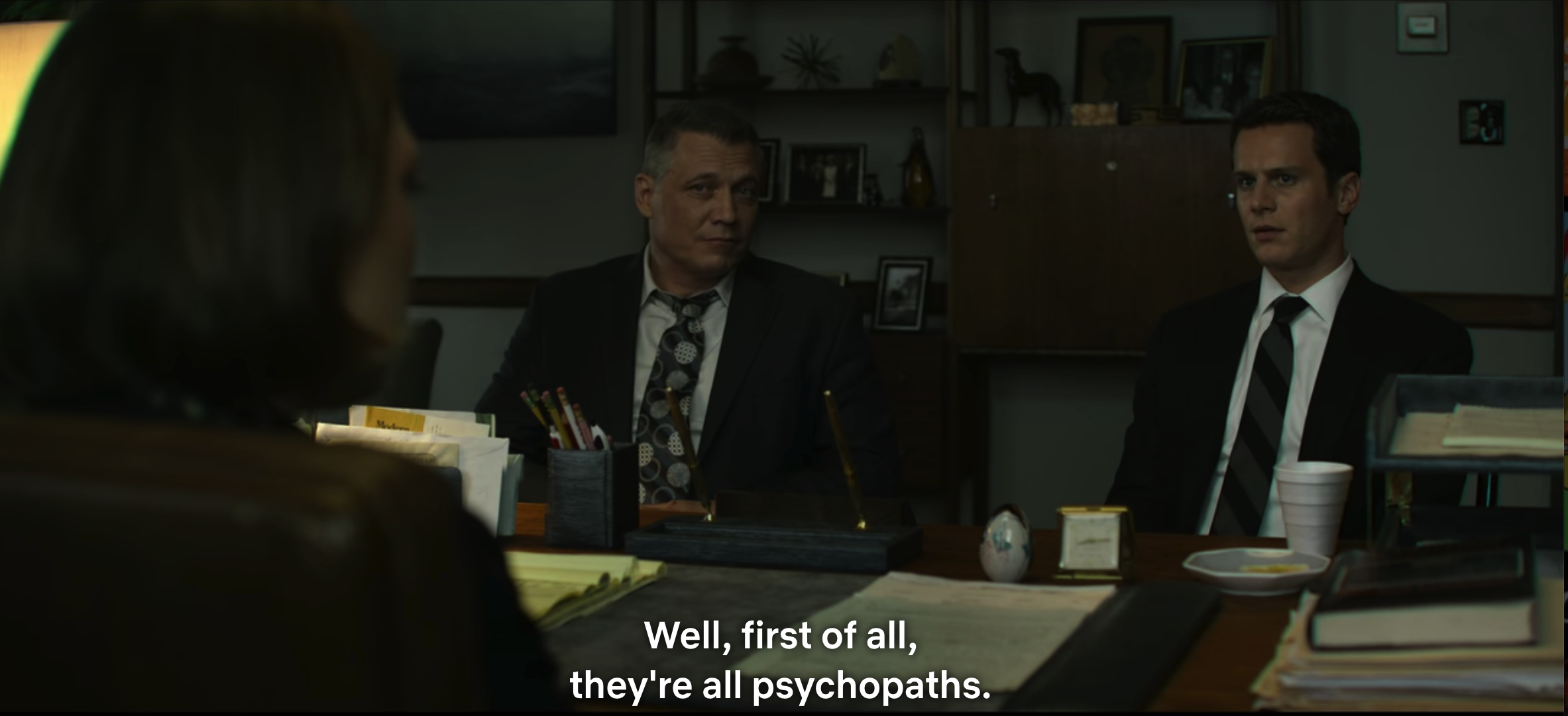
"Well, first of all, they're all psychopaths."
Mindhunter Season 1, Episode 3 (2017) Timestamp 4:42
The Art of Analogy:
The last three shots of North by Northwest (dir. Alfred Hitchcock, 1959) Timestamp 1:58
Sex scene on a subway late at night in Risky Business (dir. Paul Brickman, 1983)
Version and Variation:
Alas poor Yorick variations in versions of a film with the same title, namely, Hamlet.
Aesthetic Judgment:
"Insofar as the technique and the product lead us to dismiss the losers in the rankings, we are obviously using them to blind ourselves to the future possibilities of those losers and to the fact that hierarchies seldom remain un changed. In the other direction, however, I find it hard to imagine that many of the things that we care about-loving someone as opposed to some other one, preferring this critic to that, even choosing to read this book rather than that-would be possible without comparison. For it is hard to imagine judgments without comparison, as John Barrell suggested when he maintained that Western society since the eighteenth century had made evaluation-the perception of the value of this as opposed to that-the most common of common activities."
--Frances Ferguson
Repetition, AND the LIMITS of RESEMBLANCE: Imitation; Counterfeit; Homage; Caricature Parody; Satire
Conventions and Creativity
Here are two different versions of the same scene from two versions of the same film, namely, The Maltese Falcon. Which one is better? There is only one answer.
Two examples of the same convetion from two seasons of the same show. Which one is better? There is only one answer.
Montage
Mindhunter Season 1 Episode (dir. David Fincher, 2017)
vs.
Mindhunter Season 2 Episode 8 (dir. Carl Franklin, 2019) Time stamp 37:35
Shot Reverse Shot
Long take framed by standard shot reverse shot intro and exits:
Amazon Prime Patriot 1, Season 8 Episode
Synthesis and Sound Design
Mindhunter (2017; 2019)
Abridge the description below: Cut it down from 468 words to less than forty words:
Herman Melville, Chapter 42 "The Whiteness of the Whale," in Moby Dick.
Though in many natural objects, whiteness refiningly enhances beauty, as if imparting some special virtue of its own, as in marbles, japonicas, and pearls; and though various nations have in some way recognised a certain royal preeminence in this hue; even the barbaric, grand old kings of Pegu placing the title “Lord of the White Elephants” above all their other magniloquent ascriptions of dominion; and the modern kings of Siam unfurling the same snow-white quadruped in the royal standard; and the Hanoverian flag bearing the one figure of a snow-white charger; and the great Austrian Empire, Caesarian, heir to overlording Rome, having for the imperial color the same imperial hue; and though this pre-eminence in it applies to the human race itself, giving the white man ideal mastership over every dusky tribe; and though, besides, all this, whiteness has been even made significant of gladness, for among the Romans a white stone marked a joyful day; and though in other mortal sympathies and symbolizings, this same hue is made the emblem of many touching, noble things- the innocence of brides, the benignity of age; though among the Red Men of America the giving of the white belt of wampum was the deepest pledge of honor; though in many climes, whiteness typifies the majesty of Justice in the ermine of the Judge, and contributes to the daily state of kings and queens drawn by milk-white steeds; though even in the higher mysteries of the most august religions it has been made the symbol of the divine spotlessness and power; by the Persian fire worshippers, the white forked flame being held the holiest on the altar; and in the Greek mythologies, Great Jove himself being made incarnate in a snow-white bull; and though to the noble Iroquois, the midwinter sacrifice of the sacred White Dog was by far the holiest festival of their theology, that spotless, faithful creature being held the purest envoy they could send to the Great Spirit with the annual tidings of their own fidelity; and though directly from the Latin word for white, all Christian priests derive the name of one part of their sacred vesture, the alb or tunic, worn beneath the cassock; and though among the holy pomps of the Romish faith, white is specially employed in the celebration of the Passion of our Lord; though in the Vision of St. John, white robes are given to the redeemed, and the four-and-twenty elders stand clothed in white before the great-white throne, and the Holy One that sitteth there white like wool; yet for all these accumulated associations, with whatever is sweet, and honorable, and sublime, there yet lurks an elusive something in the innermost idea of this hue, which strikes more of panic to the soul than that redness which affrights in blood.
Recommended Reading:
Cecelia Watson, "Blubber and Blather" in Semi-Colon: The Past, Present, and Future of a Misunderstood Mark (2019), pp. 125-37.
Three books on Short-writing 1659, 1674 & 1698
Bright, Timothie, 1550-1615, Characterie : an arte of shorte, swifte, and secrete writing by character
Adam Rounce, Authorship in the Eighteenth Century
Technologies of Writing in the Age of Print

Louise Curran, Letters, letter writing and epistolary novels
Epistolae Ho-Elianae: the familiar letters of James Howell
Collins's legal training, and as he points out in his preamble: "the story here presented will be told by more than one pen, as the story of an offence against the laws is told in Court by more than one witness".

Widow Wadman: ‘paint her to your own mind – as like your mistress as you can’
Before how to draw the Widow, what ideas did reject? Why did you reject them?
Paint Her to Your Own Mind 147 artists and writers were invited to ‘Paint Her to Your Own Mind’ and represent their idea of ‘beauty’ on a blank page for exhibition and sale by auction.
Une page de Proust au hasard : 313 : Des rafraîchissements étaient servis sur une table


Louise Curran, Samuel Richardson and the Art of Letter-Writing
Jarrod Hurlbert, Pamela: Or, Virtue Reworded: The Texts, Paratexts, and Revisions that Redefine Samuel Richardson's Pamela
Leo Braudy, "Penetration and Impenetrability in Clarissa." In New Aspects of the Eighteenth Century: Essays from the English Institute. Ed. Philip Harth. New York: Columbia
Jim Springer Borck, "Composed in Tears: The 'Clarissa" Project'," Studies in the Novel; Fall 1995; 27, 3; pg. 341
William B. Warde, Jr., "Revisions of the Published Texts of Samuel Richardson's Preface to "Clarissa" The South Central Bulletin, Vol. 30, No. 4, Studies by Members of SCMLA (Winter, 1970), pp. 232-234
Ann Louise Kibbie, "The Estate, the Corpse, and the Letter: Posthumous Possession in "Clarissa,"
ELH, Vol. 74, No. 1 (Spring, 2007), pp. 117-143
JAMES BRYANT REEVES, "Posthumous Presence in Richardson's 'Clarissa'," Studies in English Literature, 1500-1900, Vol. 53, No. 3, Restoration and Eighteenth Century (SUMMER 2013), pp. 601-621
Jerome McGann, "What is a Critical Edition?," in The Textual Condition
Gerard Genette, Introduction to the Paratext, in Paratexts: Threshlds of Interpretation
M. Kinkead-Weekes, "Clarissa Restored?" The Review of English Studies, Vol. 10, No. 38 (May, 1959), pp. 156-171 Published by: Oxford University Press
The Clarissa Project. by Florian Stuber, Margaret Anne Doody and Jim Springer Borck (AMS, 1990)
To deal with the horrific events in some of the literature we will read, we will think about trauma in two ways, first as unspeakable and second as a story. Literature can be thought of as a therapeutic resource but not as a solution. It just raises questions.
Changing the Paradigm 2015 Developmental Trauma Panel | Dr. Bessel van der Kolk
A sad outcome:
Michel Foucault compared schools to prisons (not the same thing as the school to prison pipeline). it's up to you whether you think you are going to jail when you come to class or coming to join a prison riot in progress. I will be leading the riot.
ROGER-POL DROIT, Michel Foucault, on the Role of Prisons August 5, 1975
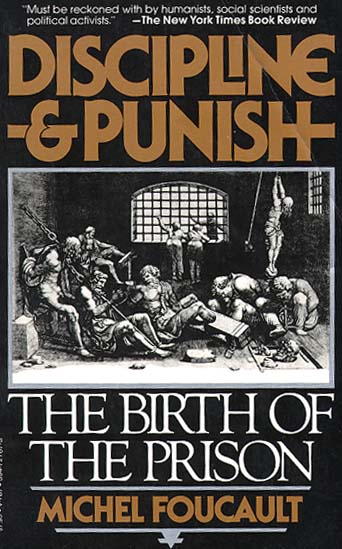
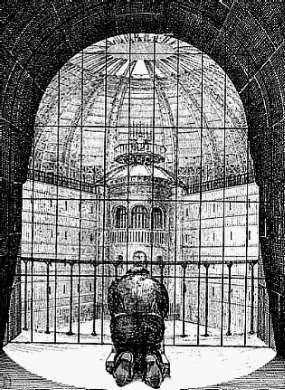


Btw, don't even think of going to graduate school to get a Ph.D in English--or any other kind of--literature.
Stephen Marche, a survivor of academia, returns to a troubled field"
TLS, June 2019
Translations and Versions of Derrida's article / book. Missing paratexts, bibliographic note on the text, with mention of variants.
Derrida, "Before the Law" in Jacques Derrida (Author), Sandra Van Reenen (Translator) Before the Law: The Complete Text of Préjugés
Trans. by Avital Ronell
by Deceased Jacques Derrida (Author), Sandra Van Reenen (Translator) Before the Law: The Complete Text of Préjugés


September Derrida, "Before the Law" in Jacques Derrida (Author), Sandra Van Reenen (Translator) Before the Law: The Complete Text of Préjugés
September Derrida Versions of Derrida's essay / book referenced in Jacques Derrida (Author), Sandra Van Reenen (Translator) Before the Law: The Complete Text of Préjugés

"Bring me the Steak Au Poivre" --Orson Welles
"The Sceptics, the only honourable type of respect among the ever-so multiply ambiguous tribe of the philosophers!"
--Nietzsche, Ecce Homo: How One Becomes What One Is
The one thing which we seek with insatiable desire is to forget ourselves, to be surprised out of our propriety, to lose our sempiternal memory and to do something without knowing how or why; in short to draw a new circle. Nothing great was ever achieved without enthusiasm. The way of life is wonderful; it is by abandonment. The great moments of history are the facilities of performance through the strength of ideas, as the works of genius and religion. "A man," said Oliver Cromwell, "never rises so high as when he knows not whither he is going." Dreams and drunkenness, the use of opium and alcohol are the semblance and counterfeit of this oracular genius, and hence their dangerous attraction for men. For the like reason they ask the aid of wild passions, as in gaming and war, to ape in some manner these flames and generosities of the heart.
--Ralph Waldo Emerson, Essays, First Series
News on the March (formerly known as "Outburts") Could compare the Russian DVD set to the Criterion Collection edition (2019) blu-ray
Volume 82, 2019/2
Judgment at risk


Leah Price, "Reading (and Not Reading) Richardson, 1756-1868," Studies in Eighteenth-Century Culture, Volume 29, 2000, pp. 87-103.
Leah Price, "Sir Charles Grandison and the Executor's Hand," Eighteenth-Century Fiction 8 (April 1996): 329-42.
Cleanth Brooks, "The Heresy of Paraphrase," in The Well Wrought Urn (1947)
Letter-Writing Manuals Were the Self-Help Books of the 18th Century
Letters Written to and for Particular Friends by Samuel Richardson, 1741
DUE SEPTEMBER 30 (Instead of DQs, read the abstract below and then do assignment below it).




"There is a startling disproportion of scale between story and discourse in Clarissa, between the agonizing simplicity of the novel's plot and the agonized mass of writing that circles around it. Before publication (or in a phase of Clarissa's history that resembles earlier practices of scribal publication), the novel passed among at least a dozen readers in several separate transcriptions, one of which weighed in at thirty manuscript volumes. When Richardson finally went to press in 1747–8, he could limit the text to seven volumes only by switching to smaller type towards the close, and the slow schedule of serialization (which roughly matched the duration of the action) meant that it took the public a year to read the work. By the third edition of 1751, Clarissa had been swollen to eight volumes and three thousand pages by Richardson's decision to restore previously deleted passages, insert fresh text, and expand the apparatus to include an amplified preface and postscript, new explanatory footnotes, and two elaborate indexes. Readers of today most often encounter Clarissa in a volume built like a telephone directory (Angus Ross's Penguin edition of 1985, to which page-reference is made in this chapter), and it takes 12,763 kilobytes to accommodate the first and third editions in Chadwyck-Healey's website, Literature Online. As one of the leading printers of his day, and one whose writing creatively exploits the resources and technologies of his profession, Richardson would have relished this last innovation. Yet the immateriality of electronic text only points up by contrast the daring of Clarissa's original bulk in a culture overwhelmed (according to the Scriblerian analysis) by bales of paper and mass-produced print."
Tom Keymer, "Richardson, Clarissa" in A Companion to Literature from Milton to Blake, David Womersley (Editor)
Here is your assignment due September 17 by 5:00 p.m. in place of DQs and on pages of Clarissa: Find three moments in the assigned pages for September 18 (and quote them) that support Keymer's description of the novel: "There is a startling disproportion of scale between story and discourse in Clarissa, between the agonizing simplicity of the novel's plot and the agonized mass of writing that circles around it."
To understand how I have planned this course, please be sure to look at John Law, After Method: Mess in Social Science Research Routledge, 2004
PK Feyerabend, Against Method: Outline of an Anarchistic Theory of Knowledge (1975)
Hans-Jörg Rheinberger, "Scrips and Scribbles," MLN, Vol. 118, No. 3, German Issue (Apr., 2003), pp. 622-636.
Russell L. Ackoff, The Art and Science of Mess Management "Interfaces, Vol. 11, No. 1 (Feb., 1981), pp. 20-26
Origins of Cartomancy (Playing Card Divination)


August 21
William Makepeace Thackery, Barry Lyndon
December 4:
Barry Lyndon (dir. Stanley Kubrick, 1976)


William Makepeace Thackery, Vanity Fair
Vanity Fair (2018)





October 23 Student Co-Leaders:
Required Reading:
William Faulkner, "Barn Burning"
October 25 Student Co-Leaders:
Required Reading:
Haruki Murakami, "Barn Burning"
October 28 Burning (dir. Lee Chang-Dong, 2018) Student Co-Leaders:

October 30 Student Co-Leaders:








1. Franz Kafka, "Letter to His Father" (online edition)
Optional:
1. Jacques Derrida, "Father, Son, and Literature," in The Gift of Death and Literature in Secret
2. Avital Ronell, "Kafka Sends a Missive to His father," from Loser Sons
Optional:
Walter Benjamin, "Reflections on Kafka"
Theodor Adorno, "Notes on Kafka"
Jacques Derrida, "Force of Law"
November 3 Required Reading:
Franz Kafka, The Trial, "The Arrest" through "The Thrasher"
There are several translations you may choose among, including these two: here (Mike Mitchell ); here (Breon Mitchell )
November 5 Required Reading:
Franz Kafka, The Trial, "His Uncle Leni" through "Block, the Corn Merchant - The Dismissal of the Lawyer"
November 10 Required Reading:
Franz Kafka, The Trial, "In the Cathedral" and "The End"
Orson Welles, dir. The Trial (1962); a DVD is on reserve in Library West. You can also rent it on Amazon or you can try watching it online here.
Due September 2 by 5 p.m. Two discussion questions and and three big words on Jacques Derrida, "Before the Law"numbered one and two, awith your name at the bottom of the document, due by 5 p.m. Email your DQs in one word document (as an attachment) to me at [email protected].
September 3
Required Readings: Deconstructive Reading versus Exegetical Reading:
Jacques Derrida, "Before the Law"
You don't need to write discussion questions on this part of Kafka's The Trial in which "Before the Law" is interpreted by a Priest and by K. in a cathedral, but please do read these few pages from the novel so you can follow Derrida's essay.
Required Reading:
Charles Dickens, Mystery of Edwin Drood (Oxford World's Classics), Chapters I-XIII, pp. 1-120.
If you have very good eyes and do not mind reading very small type, the Oxford will do fine. However, if you prefer a larger type, the Everyman Library is good (kindle and hardcover) though it has no critical apparatus. The Penguin is also good and comes with notes, like the Oxford(paperback).
Recommended Reading:
Required Reading:
Charles Dickens, Mystery of Edwin Drood (Oxford World's Classics) Chapters XIV to the end, pp. 121-217.
YOUR FIRST ASSIGNMENT Due Tuesday, January 8 by 5:00 p.m.: One discussion question on How to Live: Or A Life of Montaigne in One Question and Twenty Attempts at an Answer, and three BIG WORDS, numbered one, two, and three, on each reading. Put your name at the top left of the document. Email all work to me at [email protected] . With One Exception, Discussion Questions are due the day before class on Sundays and Tuesdays by 5:00 p.m.
NOTE BENE: Your First Paper (500 words, not including quotations) will be DUE Saturday by 11:59 p.m. You may write your paper on any text we have read. I encourage you to make up your own paper topic. If you need any help, just email or talk to me in class and we can schedule a time to talk.
Due Sunday, January 13 by 5:00 p.m.: Two discussion questions on Michel de Montaigne, "Of Bookes" and three BIG WORDS, numbered one, two, and three. Put your name at the top left of the document. Email all work to me at [email protected] With One Exception, Discussion Questions are due the day before class on Sundays and Tuesdays by 5:00 p.m.
Due Tuesday, January 15 by 5:00 p.m.: Two discussion questions on Pierre Bayard, "Chapter IV: Books You Have Forgotten" and three BIG WORDS, numbered one, two, and three. Put your name at the top left of the document. Email all work to me at [email protected] Discussion Questions are due the day before class on Sundays and Tuesdays by 5:00 p.m. With One exception, nothing is due Thursdays for class on Fridays.